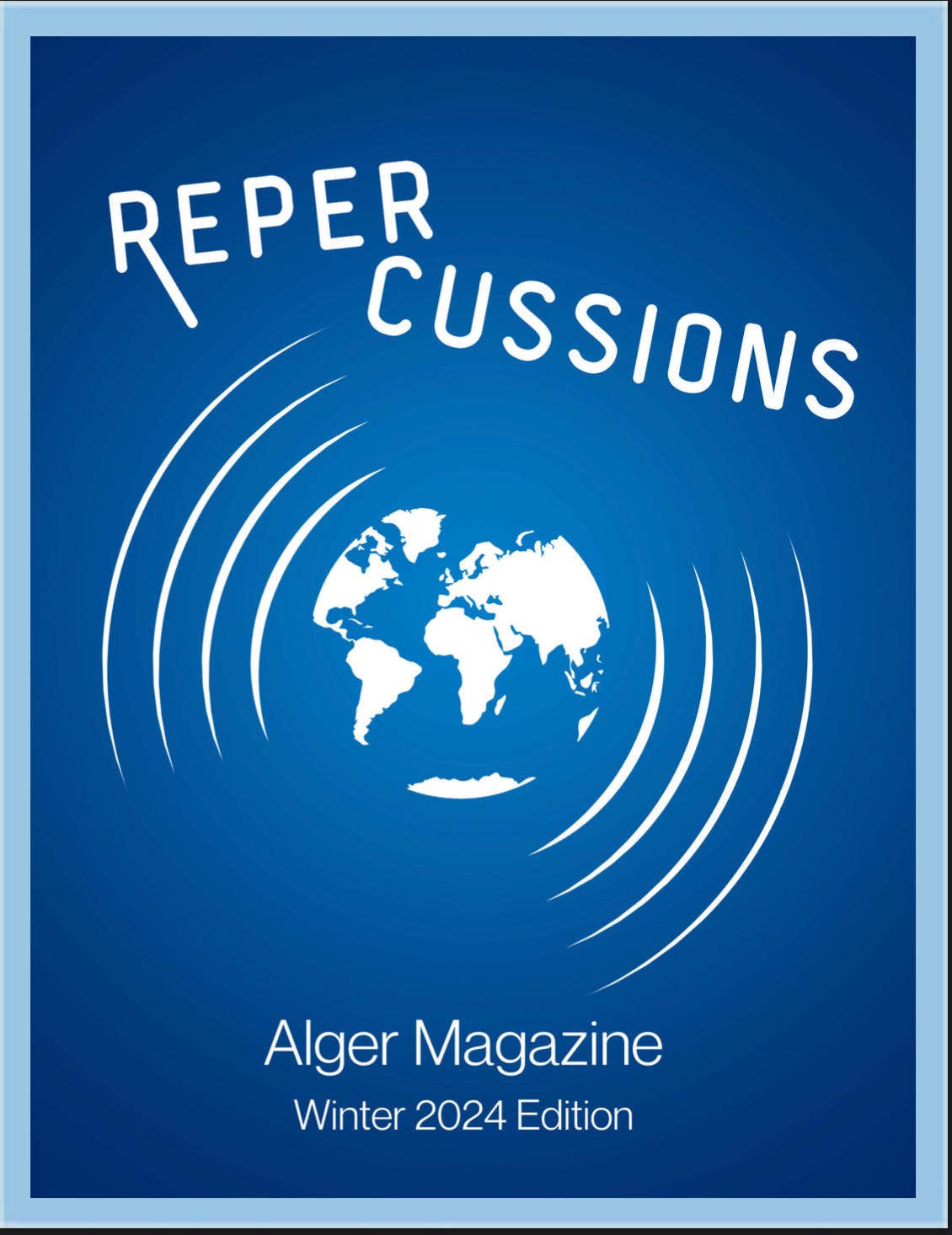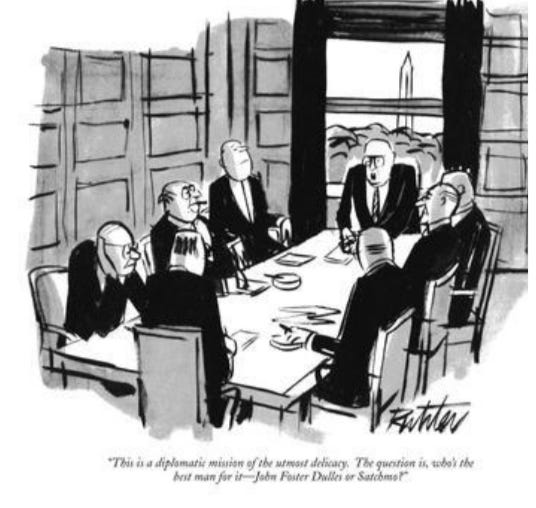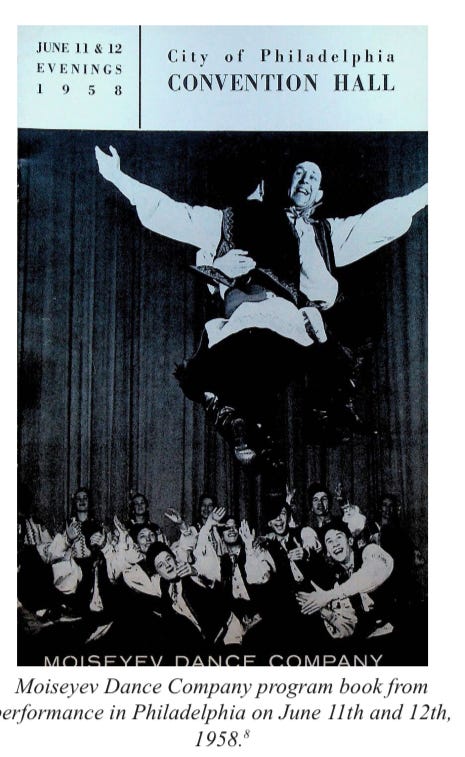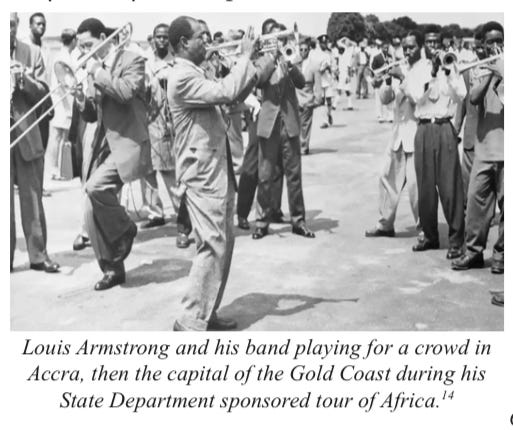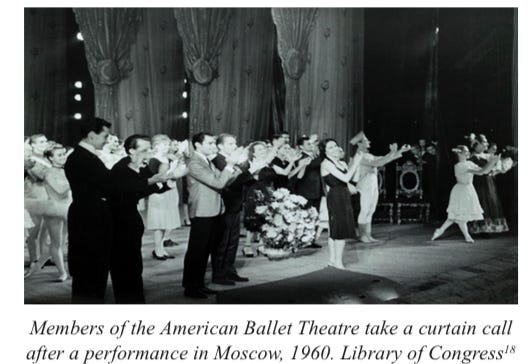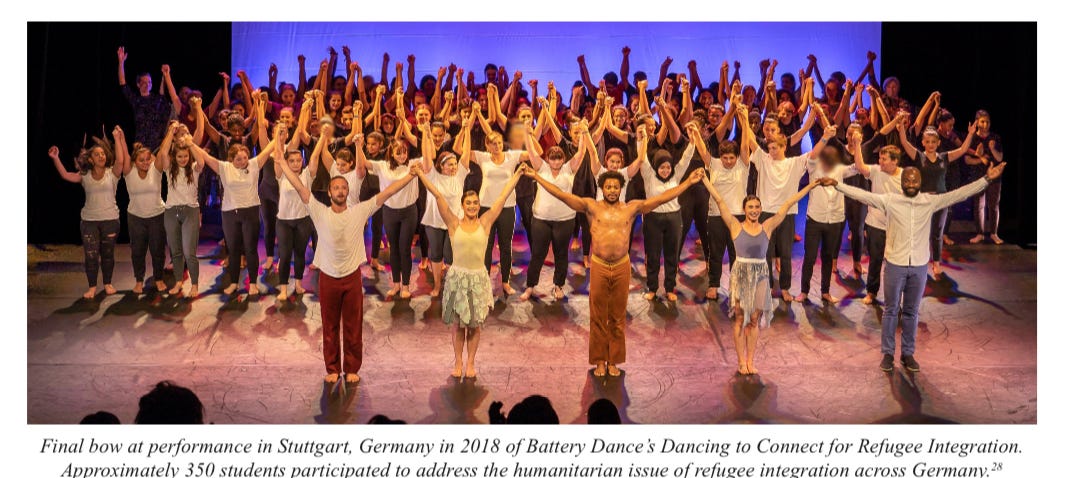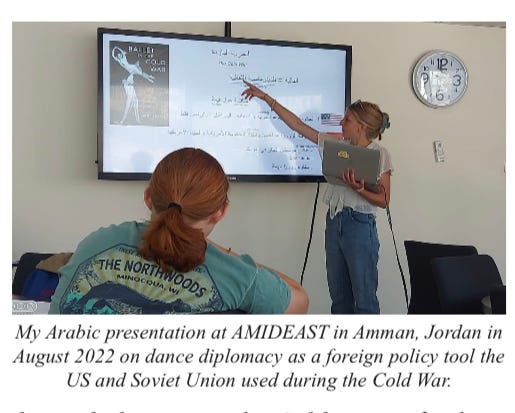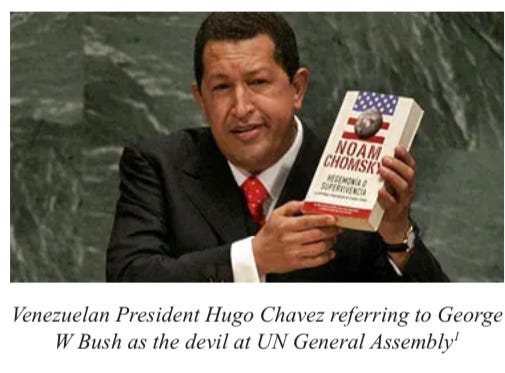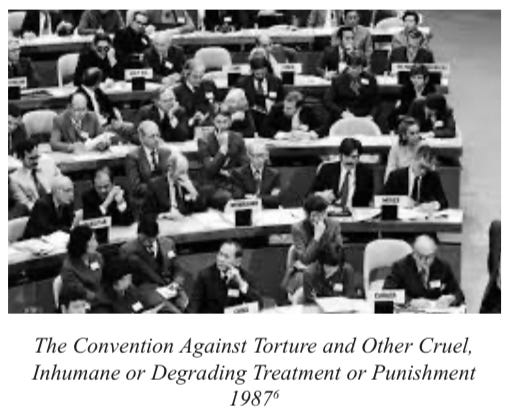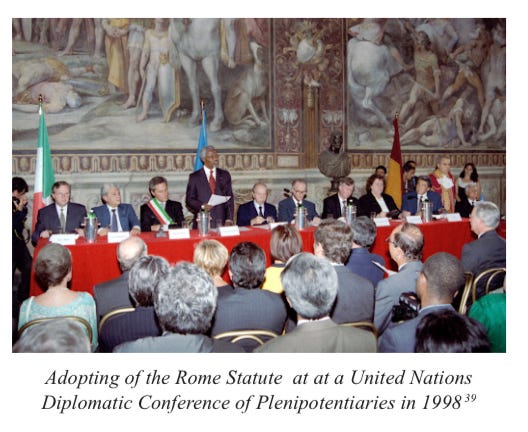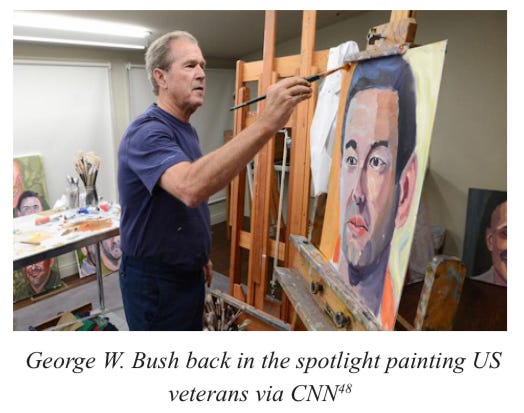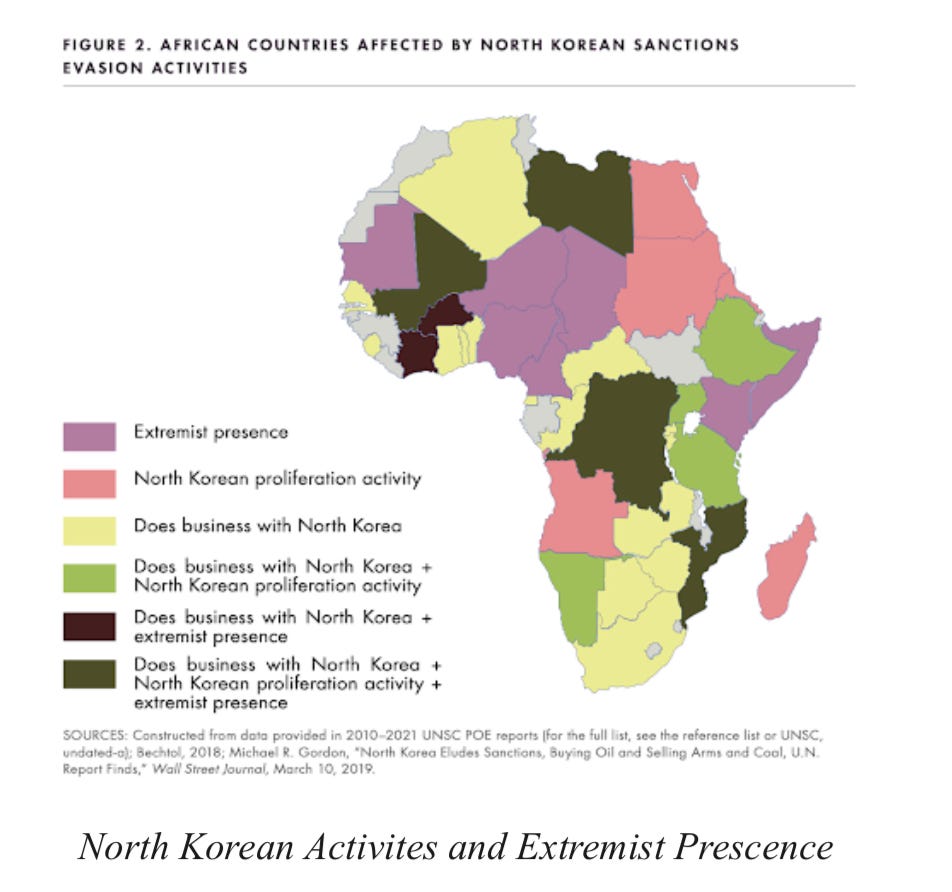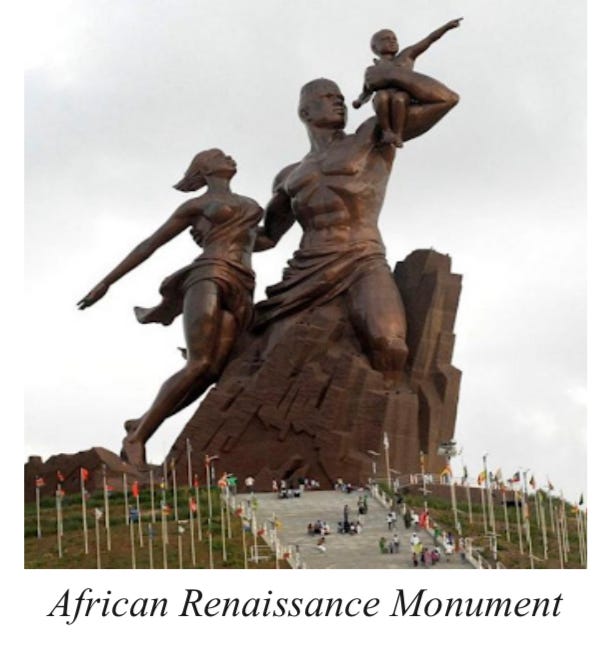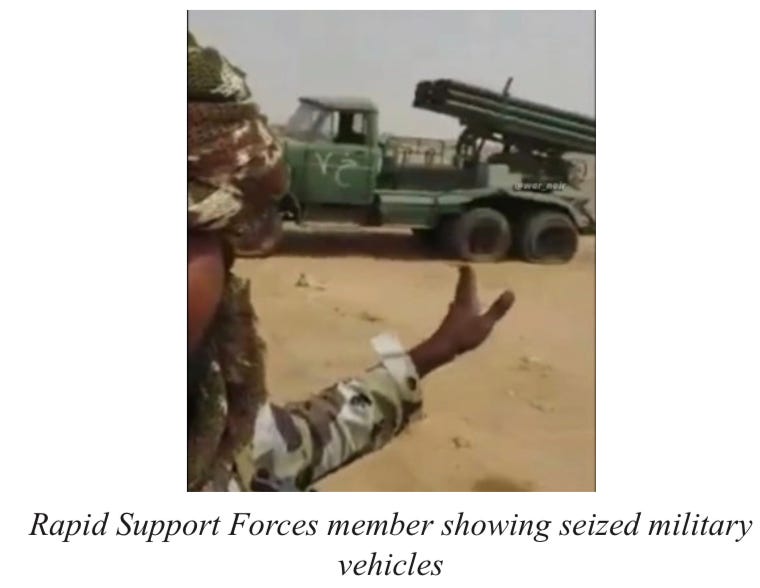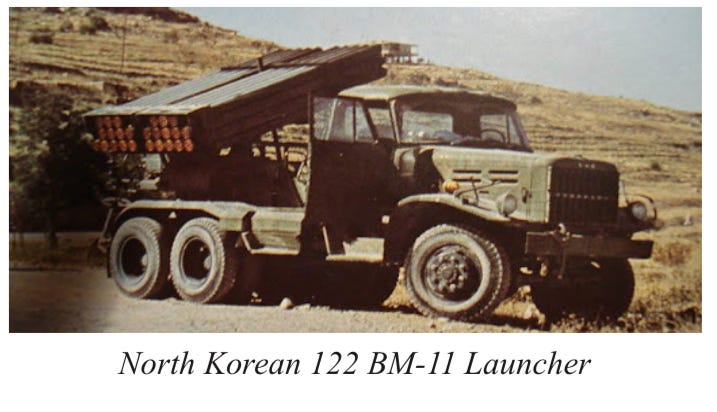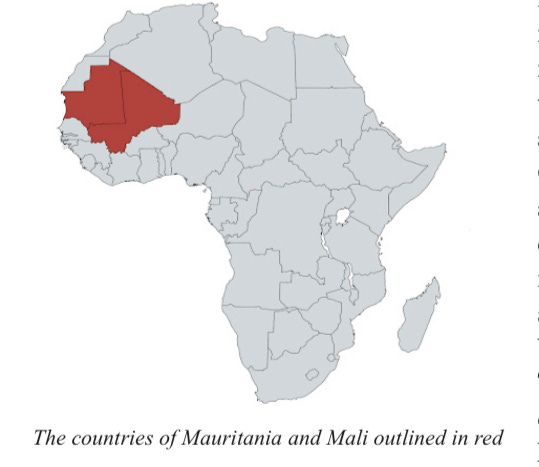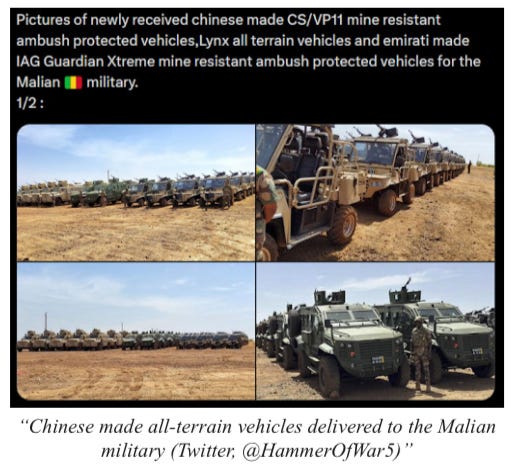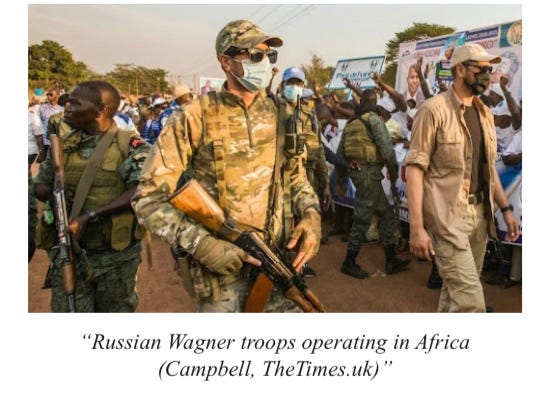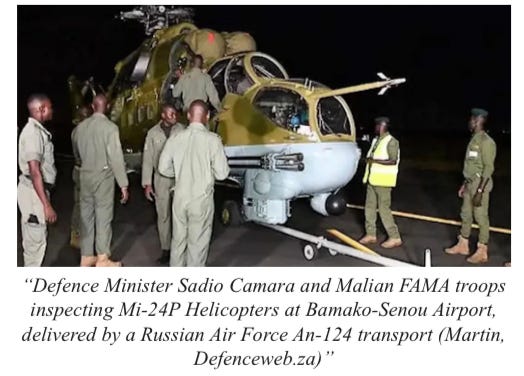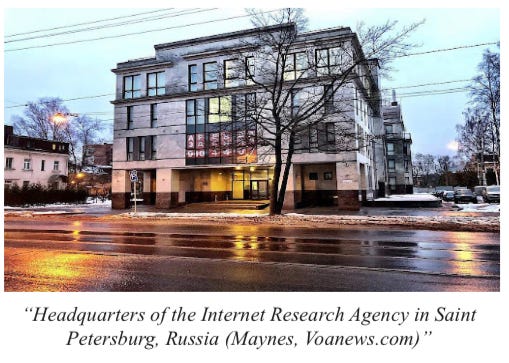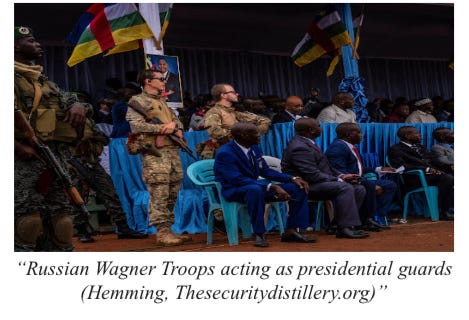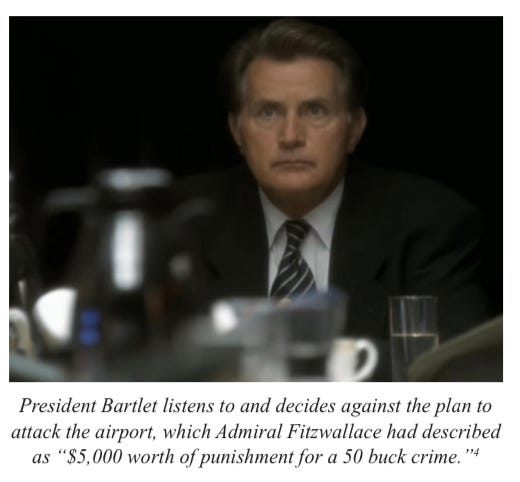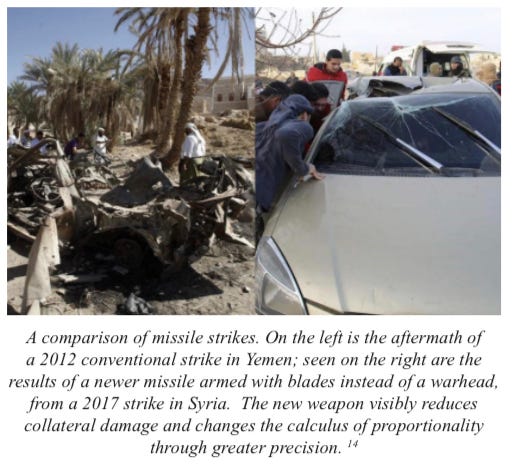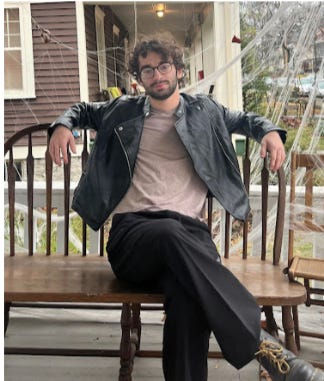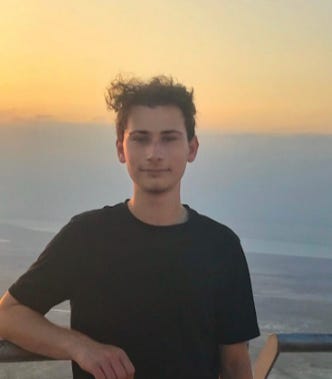Table of Contents
Letter from the Editor
Dancers and Diplomats: The Role of Dance in American Foreign Policy
The Smell of Sulfur Lingers in the Air
Silent Alliances: North Korea’s Collaborations with African Nations
Sovereignty at Stake: The impact of Chinese and Russian Influence on Remote Communities in Sahel
Assessing Proportionality In International Law
Meet the Authors
Letter From the Editor
Having been a member of Alger Magazine since August 2021, it has been my pleasure to see the organization evolve since then and an even bigger honor to lead it this year as Editor-in-Chief. One characteristic that has always stood out to me about Alger Magazine is the diversity of people it brings together - and with that comes an important mixture of perspectives, news, and new sources. Quality journalism and press freedom around the world must continue to champion this diversity of thought.
Our publication is different from past years as this is our first year with a semiannual publication, with this being our first Winter Edition. The articles cover a range of broad and niche topics in international affairs, but going through the submissions, there was a theme that stood out through all of them: Repercussions. What are the geopolitical and personal effects of public diplomacy programs? What have been the subsequent consequences of Bush’s decision to invade Iraq twenty years ago? What are the results for Africa with growing North Korean, Chinese, and Russian influence on the continent? What is a proportional reaction? Our writers this semester explored these intriguing and bold questions. A big thank you to the writers for their hard work and well-written articles, and to everyone who attended the Alger Magazine meetings.
Many thanks to the incredible managing editors at Alger Magazine, Abriana Malfatti and Michael Sarkis, for their hard work this past semester. I could not run this magazine without your support and contributions, and I want to recognize your tremendous value to this Alger team. We all hope you enjoy reading this magazine as much as we did making it.
My final thank you goes to Imaan for helping me brainstorm the cover design for this publication. She is a teenager from Aleppo, Syria whom my mother works with through a refugee volunteer assistance program after Imaan moved to my hometown in New Jersey early last year. She loves art and enjoys drawing and sketching out characters from books. The arts — from drawing to music to dance to writing — play several valuable roles in foreign affairs. They present a unique interpretation of international affairs. They are an outlet for youth and capture the importance of the civilian voice. And the arts, especially through writing in the form of journalism, work to shed light on some of the worst political and humanitarian conflicts of our generation. Amidst democratic backsliding and wars globally, the work and safety of journalists must remain protected, and we all must continue to recognize the important role they play in our world.
Sincerely,
Rachel Simroth
Editor-in-Chief
Dancers and Diplomats: The Role of Dance in American Foreign Policy
Rachel Simroth
“This is a diplomatic mission of the utmost delicacy. The question is, who’s the best man for it – John Foster Dulles or Satchmo?” A 1958 Mischa Richter political cartoon comparing the American Secretary of State to an artist may appear as a perplexing power comparison at first glance. Yet, musicians and dancers represent vital foreign policy instruments for the American government in its cultural diplomacy efforts. Cultural diplomacy is a build-bridging performance on the world stage. Diplomats seek to forge connections and mutual understanding between countries through the cultural exchange of arts and education while simultaneously promoting American values and policies.
Through the Cold War and into the twenty-first century, the Department of State sponsored several American dance companies’ performances around the world. Dance diplomacy programs abstractly promote US geopolitical objectives as they often lay a foundation for future US diplomatic outreach - from American dancers performing for Kenyan post- colonial leader Jomo Kenyatta in 1967 to dancing in Myanmar in February 2010 as the Obama administration sought to expand US-Burma relations. The State Department sent Alvin Ailey Dance Company on an Africa tour in 1967 to “explicitly [bring] together African and African American self-determination movements” and hope that “African audiences would be inspired by the American presence to bend African post- colonial movements towards American democracy.”2 That tour also includes stops in several recently decolonized African nations “where the United States worried about increasing communist leanings.”3 More recently, Myanmar was one of the first countries targeted by the Obama administration to increase communications with, and its new relationship with Myanmar became a key building block of Obama’s Asia policy. A year after the ODC Dance Company performed, President Obama announced a major shift in US policy towards Myanmar, and three years later, in 2012, President Obama and then Secretary of State Clinton made a widely publicized visit to the country.4 Dance is a unique diplomatic vehicle as it allows the United States to communicate — both intellectually and emotionally — with international audiences without requiring a shared language.5 These dance exchanges are a “coupling of the physical and political” and “help us see how people come together in social networks, a central concern for policy.”6 Dance has been an important soft power tool for the US as artistic exchange builds networks between civil societies abroad and Americans.
Dance diplomacy first entered the stage in American foreign policy as a means to compete with the Soviet Union's cultural outreach programs during the Cold War. The bilateral 1958 Lacy-Zarubin Agreement allowed cultural, educational, and scientific exchanges between the US and the Soviet Union. In the spring of 1958, the Russian Moiseyev Dance Company performed in cities across the United States. With those performances, the company sought to present a positive picture of a unified Soviet Union, incorporating folk dances from multiple cultures - Ukraine, Azerbaijan, and Poland - within the Soviet sphere of influence.7 Moiseyev’s performances were
met with immense enthusiasm from American audiences, with its first performance in New York sold out and an additional four days of performances were added in the larger venue of Madison Square Garden to accommodate demand.9 The Russian dancers both fascinated and frightened American audiences, as the Dance Magazine's June 1958 edition wrote how "it is extremely clear that a large part of the American public is enjoying, and being affected by, Russian propaganda currently here in the form of Moiseyev Dance Company.”10 The tour produced newfound empathy towards the people of the Soviet Union, resulting in cooler tensions during this period of the Cold War. In response, the US sent the American Ballet Theater to tour the Soviet Union as cultural representatives of American life and excellence to make respective impressions.11 In this moment, the US government had become well aware of the power cultural diplomacy programs had in projecting American soft power in the Cold War. In 1959, the State Department persuaded President Eisenhower to establish the Bureau of Educational and Cultural Relations within the State Department to better coordinate all US cultural exchange programs.12
These Cold War artistic exchanges promoted a nation’s cultural values in contrast to the other superpower. The Soviet Union outlawed American music genres, like jazz and rock and roll, as officials criticized it as culturally corrupt.13 On the other hand, in October 1960, Louis Armstrong — a famous American jazz trumpet player — embarked on a three-month Department of State tour of twenty-seven cities in Africa to “power- fully convey his deep sense of connection to
African peoples and their shared aspirations for freedom.”15 The US government sent Armstrong to Africa at a time when the world was captivated by American jazz and blues. America capitalized on the pleasure of American jazz music to build support for American values and policies that directly contrasted with the Soviet Union’s view of the world.
The style of dance promoted by each superpower conveyed the contrasting cultural and political values of each country. With the United States standing as the center of modern dance, the "free- flowing movement of modern dance was thought to represent the liberty of the US" in contrast to the communist Soviet system. Martha Graham’s American modern dance company performed Appalachian Spring globally, with it premiering in Vietnam in the 1950s. This piece sought to romanticize America’s frontier heritage and push the cultural values of self-reliance, individualism, American toughness, and capitalism. Conversely, the world-renowned Russian ballet schools and the "virtuosity of Soviet dancers show[ed] the fruits of collectivism.” The Russian company Bolshoi Ballet performed Spartacus during its tours around America, a ballet piece about a slave uprising and the proletariat. It intended to both critique racial inequality in the United States and promote communism.16
The power and beauty of dance diplomacy lie in its ability to form human connections between civilians, even at their government’s most volatile political moments. In October 1962, the New York City Ballet Company was one week into an eight-week State Department-sponsored Soviet tour when US planes identified Soviet missiles in Cuba. Military tensions between the US and the Soviet Union escalated rapidly just as the US ballet company began performances at the Palace of Congresses Theatre, located in the heart of the Kremlin complex.17 US embassy
staff reportedly warned the dancers to expect a hostile audience given geopolitical world events – yet the opposite occurred. “Bis! Bis! Encore! Encore!” the audience shouted as the American dancers received a standing ovation from three thousand Soviet citizens. US principal dancer Edward Villella even defied his dance company policy forbidding encores that night and returned to the stage to repeat his solo from George Balanchine’s Donizetti Variations.19 Two narratives were present in the Kremlin in October 1962: one by American ballet dancers building bridges with the Soviet citizens over their mutual love of ballet, and the second was down the street as Soviet Union officials negotiated with their US counterparts, with “both sides acting on the belief that Soviet and American ways of life were absolutely incompatible.”20
Although Cold War dynamics provide a historical understanding of the birth of cultural diplomacy programs in American foreign policy, their purpose is to create spaces for cultural understanding and collaboration, not competition. In an interview I conducted with Helena Finn, former Acting Assistant Secretary of State for Educational and Cultural Affairs at the Department of State and current Chair of the Board of Directors of Battery Dance, she “found ways to use cultural diplomacy to create a bridge between audiences on the opposite sides of long-standing conflicts.”21
While serving at the US Consulate General in Lahore, Pakistan, Helena organized a conference on postmodernism and invited participants from India. Participants included an Indian scholar of American literature, a notable Indian Jewish poet, a prominent dancer and scholar of dance — Millicent Hodson — as well as Pakistani artists, dancers, writers, poets, and musicians. Helena chose this topic because “it was at the center of academic and scholarly discussion at the time” and the event was “centered on the arts, rather than politics,” such as debates on the conflict between India and Pakistan. It can be difficult to quantify the success of cultural exchange programs. Yet Helena noted that “for the Indians who had lived in Lahore before Partition, this was an opportunity for an emotional reunion with their former classmates.”22 In this instance, a US artistic exchange embassy event aligned with US policy objectives of de-escalation on the border with its valuable policy objective of humanizing participants on either side of the conflict.
Dance diplomacy programs also emulate conflict resolution political objectives within American foreign policy. Upon arriving at her posting as a Counselor for Public Affairs at the US Embassy in Tel Aviv from 2003- 2007, Helena “realized that Jewish and Arab young people had very little contact with one another.” Having previously met Jonathan Hollander, the Founder and Artistic Director of Battery Dance, she felt Battery Dance’s focus on mutual understanding “was an ideal fit for our cultural diplomacy mission to promote peace.” As a US embassy official, she organized the following program:
“The dancers came to Jaffa and worked with young people from both communities to create original works. These were then performed before audiences that brought together parents and other guests from both communities. It was an exhilarating experience that confirmed me in the conviction that people who hold very negative preconceptions about other can over- come them through joint participation in programs that enable them to truly express their feelings.”23
Aligning with the American political and economic policy objectives in the region, Helena noted her project followed “in the spirit of the larger Wye River Project created during the Clinton Administration that provided funding to put Israelis and Palestinians in projects devoted to education, water management, technology, archeology, agriculture, and other areas of common interest.”24
US dance companies repeatedly work in collaboration with the US Department of State to foster this type of engagement within local communities around the world. As Minister-Counselor for Public Affairs at the US Embassy in Berlin from 2007-2010, Helena said she noticed “the children of the immigrant and asylum communities [with roots in Turkey, the Middle East, and Africa] were having difficulty relating to their German counterparts.” In response, the US embassy arranged to work with a local high school in an immigrant neighborhood that also housed a local population of ethnic Germans. Helena turned to Battery Dance again, commenting that “Battery Dance does something uniquely American” as it “encourages the students to create their original works” in contrast to other dance companies that only trained other dancers. Battery Dance conducted dance workshops for the students, and “at the end of the workshops, we held a performance to which the parents were invited. These immigrant parents glowed with pride to see their children on the stage in a German high school.”25 Through this program, a US dance company was able to foster refugee assimilation at the community level. The work of refugee integration and community engagement remains critically important in Germany today, particularly given recent reports that right-wing extremists —
including members of the far-right AfD political party — met to discuss the deportation of millions of immigrants, including some with German citizenship.26 Battery Dance is one of several organizations contracted with the Department of State to pursue similar diplomatic public outreach aims over the years. DanceMotionUSA was an international dance touring program of the Bureau of Educational and Cultural Affairs administered by BAM (Brooklyn Academy of Music). Formed in 2010 and active until 2018, BAM worked with US embassies in 56 countries. US-based dance companies were sent out on month-long tours focused primarily on community engagement, with American dancers offering free public performances, providing workshops, and taking master classes with local dancers.27
As both a dancer for eighteen years of my life and a person pursuing a career in foreign policy, dance diplomacy strikes a personal note with me. I was first introduced to the practices of dance diplomacy by a former Russian diplomat in her dance studio in Amman, Jordan. I lived in Amman for a summer studying Arabic at AMIDEAST, a US non-profit organization dedicated to cooperation and mutual understanding through language training. Recommended to me by a UN employee I met in Amman who was also a dancer, I signed up for a ballet class that met twice a week in the evenings. After one of the classes, I stayed behind in the studio and talked with the ballet teacher about her life. She told me how she moved to Jordan decades ago to work for the Russian Embassy in Amman as her government wanted to promote ballet to the Jordanian public as a form of cultural diplomacy. In the following weeks, I found myself reading in cafes in Amman article after article to understand dance diplomacy. That moment inspired me to do my final Arabic class presentation that summer on how both the US and Soviet Union used
dance diplomacy in the Cold War to further their foreign policy interests. Dance diplomacy is not a uniquely American or Russian expenditure, and what makes it effective is the natural mutual understanding it fosters. Before that ballet class, I took a Dabke dance class twice a week in the evenings, taught fully in Arabic, on the rooftop of a dance school in northern Amman near my host family’s house. That class was an insight for me into Levantine culture through dance and music, and allowed me to engage with locals even though I was not fluent in Jordanian Arabic.
My time in the Middle East shed light on the diplomatic uses of artistic mediums in American foreign policy. Cultural diplomacy fosters these valuable people-to-people interactions that form the basis of connections and cooperation with civil society - beyond the military aid deals and the high-level government agreements. Cultural exchanges cultivate empathy, a currency used prior to brokering political diplomatic achievements and which has given a face to American power in the post-World War II era. Different American administrations award varying levels of attention to funding these initiatives. Yet, with polarization and authoritarianism on the rise globally, I believe cultural exchanges should be increasingly important. With this, I asked Helena - who was responsible for overseeing all US global and educational cultural exchanges at the State Department in the early 2000s - where she thinks the State Department should focus on sending dance companies today: “The Bureau should focus on all regions of the world by working closely with the regional Bureaus of the State Department. Programs for wealthy nations can be coordinated through public-private efforts in cooperation with entrepreneurs. For the countries in the middle tier, as well as the countries that suffer from extreme poverty, funds must be made available to promote cultural exchange.”29 The FY 2023 Request for the Public Diplomacy Bureau in the State Department was $701.4 million, covering global efforts to expand and strengthen the relationship between the US and citizens of other countries.30 These cultural exchanges exemplify how the universality of art, music, and dance foster empathy at the individual level around the globe. These artistic exchanges are remarkable as they promote continued dialogue between different nations, all without the need for the same language.
So now I ask the audience again: This is a diplomatic mission of the utmost delicacy. The question is, who’s the best person for it: Diplomats or dancers?
The Smell of Sulfur Lingers In the Air
Abriana Malfatti and Michael Sarkis
In September 2006, Venezuelan President Hugo Chavez began his speech at the United Nations General Assembly meeting: “The devil came here yesterday,” and that “it smells of sulfur still today.”2 Yet, Ecuadorian Presidential Candidate Rafael Correa condemned Chavez for comparing President Bush to the Devil at the United Nations General Assembly meeting.3 He thought it was an insult to the devil.4
While President Bush is not the devil incarnate, he has egregiously violated The Convention against Torture and Other Cruel, Inhuman or Degrading Treatment or Punishment (UNCAT). The Convention established on June 28th, 1987 utilized former international law such as the UN charter and the Univeral Declaration Of Human Rights to “make more effective the struggle against torture and other cruel, inhuman or degrading treatment or punishment throughout the world.”5 While the Bush Administration committed numerous violations of international law during the Iraq War, this article will focus on the administration’s violations of UNCAT. Bush and his administration deserve to be prosecuted in a court of law for their violations of UNCAT as the United States must take a stance against impunity in order to uphold international law. Two pathways towards justice will be examined in this paper: the domestic route and the International Criminal Court. This article will examine what aspects of The Convention Against Torture were violated and debate the ideal solution for international justice.
Legal Framework
With regards to our legal argument, we used the following legal definition of torture from UNCAT to construct our analysis:
“Any act by which severe pain or suffering, whether physical or mental, is intentionally inflicted on a person for such purposes as obtaining from him or a third per- son information or a confession, punishing him for an act he or a third person has committed or is suspected of having committed, or intimidating or coercing him or a third person, or for any reason based on discrimination of any kind, when such pain or suffering is inflicted by or at the instigation of or with the consent or acquiescence of a public official or other person acting in an official capacity. It does not include pain or suffering arising only from, inherent in or incidental to lawful sanctions.”7
The rest of our legal argument will use the UNCAT definition to demonstrate why the Bush administration’s actions during the Iraq War were not justified under international law.
The first use of torture can be seen following 9/11, when the US military and CIA interrogators were instructed to take a gloves off approach to handling captured or detained individuals.8 To help the interrogators in this mission and to avoid legal trouble, the US Department of Justice Office of Legal Counsel narrowly defined torture to allow the following methods: waterboarding, wall-banging, sleep deprivation, slapping, shaking.9 Alongside the authorization of these torture methods, then Secretary of Defense Donald Rumsfeld authorized having subjects stand for up to four hours without a break.10 The US utilized black-sites — secret prisons in Europe and Asia — to keep high value Al-Qaeda prisoners for extended periods of time.11 Survivors of these black-sites report the use of torture, such as the case of Khalid El- Masri. In December 2003, El-Masri was taking a bus ride from Ulm, Germany to Skopje, North Macedonia, when he was detained by Macedonian guards and later handed over to CIA custody.12 Under the impression that El-Masri was a high-profile target, the CIA transferred him to a secret CIA prison outside of Kabul, Afghanistan known as the “Salt Pit,” even though the CIA was aware that was innocent during his transfer to Kabul.13 He remained in brutal conditions until May 2004, when he was blindfolded and deposited on a mountain road in Albania.14
The formation and measures employed at these CIA black sites represent the overall dismissive attitude the Bush administration had towards respecting international law. These methods of torture were utilized throughout the Iraq War, according to the Human Rights Watch, “After the US invasion of Iraq in 2003, the US and its coalition allies held about 100,000 Iraqis between 2003 and 2009. Human Rights Watch and others have documented torture and other ill-treatment by US forces in Iraq.”15 These actions not only fit UNCAT’s definition of torture, but the actions of the administration during the Iraq War were not sanctioned by any UN governing body. According to Dr. Alexander Thompson in his discussion of the second Iraq War, “there is no doubt that the overwhelming impression of leaders and their publics around the world was that the war was fought without Security Council backing and, indeed, that it was fought against the vocally expressed wishes of most UNSC member states. Thus both legally and practically, it is safe to characterize the Second Iraq war as having been conducted without IO (international organization) approval.”16 Given this, any and all actions taken by the Bush administration during this period in regards to torture are illegitimate and fall within the violation of basic international law.
In addition to violating the basic definition of torture under international law, the threat or act of war (legitimate or not) is not a permissible excuse for any type of torture. Article 2.2 of UNCAT explains, “No exceptional circumstances whatsoever, whether a state of war or a threat of war, internal political instability or any other public emergency, may be invoked as a justification of torture”.17 Article 2.3 of UNCAT goes even further clarifying that, “An order from a superior officer or a public authority may not be invoked as a justification of torture.18 Bush and his administration were in clear violation of international law and there is absolutely no justification for their actions, especially since the claim of Iraq harboring weapons of mass destruction was false.
President George W. Bush’s Involvement
Debates have swirled over if President Bush was aware of or authorized the use of these torture policies by his own administration. According to a 2014 Senate Committee on Intelligence Report, Bush was not fully briefed on the CIA torture program until April 8, 2006.19 The Senate Report states that “CIA records state that when the president was briefed, he expressed discomfort with the ‘image of a detainee, chained to the ceiling, clothed in a diaper and forced to go to the bathroom on himself.”20 Along these lines, John Rizzo - the CIA’s top lawyer at the time - reports that George Tenet - the director of the CIA - told him: “I have no recollection of ever briefing President Bush about the techniques at that time,” referring to the interrogation of Abu Zubaydah, who assisted Al-Qaeda in coordinating its attacks, in 2002.21 However, President Bush and Dick Cheney’s statements contradict the Senate Report and George Tenet. In his memoirs, President Bush wrote that, in 2002, Tenet approached him regarding the interrogation of Abu Zubaydah, and in turn, President Bush requested new interrogation methods from his team to elicit information from Abu Zubaydah.22 President Bush then supposedly had the Department of Justice review the legality of these new techniques, and afterwards Bush claims to have taken a look at the list of interrogation techniques, writing that “there were two that I felt went too far, even if they were legal. I directed the CIA not to use them.”23 Additionally, former vice president Dick Cheney said that the Senate Report was “full of crap” and contradicted President Bush’s statements, saying President Bush knew about the techniques used by the CIA, and everything he needed to and wanted to know about the CIA program.24
Towards the Transvaluation of the ICC
According to Section 2340A of Title 18 of the United States Code, public officials are prohibited from committing torture against any individual persons within their custody or control. The statute defines torture as “acts specifically intended to inflict severe physical or mental pain or suffering” and only applies to torture committed outside the United States.25 Alongside this statute, the Supreme Court’s ruling in Hamdan v. Rumsfeld allows for the enforcement of the Geneva Convention within US law. Osama bin Laden’s former chauffeur, Salim Ahmed Hamdan, filed a petition for writ of habeas corpus to challenge his detention in the notorious Guantanamo Bay. Yet, before a federal district court could examine his petition, he was deemed an enemy combatant by a military tribunal. However, the federal district court would eventually grant Hamdan his petition, ruling that before he could be tried before a military commission, Hamdan must be granted a hearing to determine whether he was a prisoner of war under the Geneva Convention.26 The Circuit Court of Appeals for the District of Columbia overruled the lower court’s decision, ruling that the Geneva Convention could not be enforced in the federal courts and that the establishment of military tribunals was authorized by Congress.27 Hamdan’s case was brought before the Supreme Court, and on June 29, 2006, in a 5-3 decision it ruled that the military commissions were not authorized by Congress or by the inherent powers of the Executive. As a result, military commissions were required to comply with the ordinary laws of the United States and the laws of war, which allowed for the application of the Geneva Convention in the US. Given that the Supreme Court allowed for the application of the Geneva Conventions within the United States legal system, it may be possible to prosecute President Bush for violating the UNCAT and Section 2340A of Title 18, USC.
An important question still remains: why should President Bush be tried in the US and not by the ICC? The reason can be found within the jurisdiction of the ICC and the principle of complementary. The ICC only has jurisdiction over crimes that were committed by a state that is party to the Rome Statute, in a state that has accepted the Court’s jurisdiction or in the territory of a party to the Rome Statute.28 The Court can also claim jurisdiction over crimes that were referred to the ICC Prosecutor by the United Nations Security Council according to a resolution that was adopted under Chapter VII of the United Nations Charter.29 Based on this, the ICC lacks jurisdiction over many of the crimes committed by President Bush. Currently, the United States is not a member of the Rome Statute, and neither is Iraq, thus denying the ICC jurisdiction to prosecute Bush’s crimes within the US, US territories, or Iraq.30Similarly, since the US is a member of the Security Council, it can veto any resolution that would seek to subject the United States to the ICC’s Jurisdiction.
While Afghanistan is a member of the Rome Statute and therefore the ICC has jurisdiction to prosecute Bush for war crimes committed the US could escape the ICC’s jurisdiction through the principle of complementarity, found in the preamble and Article 17 of the Rome Statute.31 This principle states that if a State announces that it will be pursuing its own investigation, within one month of being told that the ICC Prosecutor is pursuing an investigation, it can avoid the ICC’s investigation.32 Thus, to escape the Prosecutor’s jurisdiction, the US would simply need to conduct its own investigation into any crimes it may have committed in Afghanistan. Given these circumstances, the only way Bush could be tried by the ICC would be with a referral by the UN Security Council or the unwillingness of the United States
to open an investigation against Bush. The former is unlikely to happen since any of the permanent five members of the Security Council could veto any resolution that would address the matter. The latter is more likely to occur and bring President Bush Bush within the ICC’s jurisdiction, assuming that the involved parties cooperate with the ICC. However, even if the ICC opened up an investigation against and chose to prosecute President Bush, the United States would not hand him over to face trial. In addition, it is dubious as to whether handing President Bush over to the ICC would set a precedent for world leaders and countries to be held accountable more than they already are, as the ICC has already attempted to do so and has demonstrably failed.
This failure is exhibited through the ICC’s near sole focus on prosecuting crimes in Africa, earning the nickname “Court for Africa.”33 This problem stems from not from the ICC itself but rather from the fact that powerful nations will not subject themselves to prosecution by the ICC. For example, in 2011, the UN Security Council passed Resolution 1973, authorized member states to enforce a no-fly zone in Libya and take whatever action was necessary to protect civilians and civilian populated areas from attack.34 This allowed NATO countries to intervene, but strangely, the resolution included language that provided immunity from prosecution or investigation for NATO allies.35 This exemption from prosecution for Western powers predates the ICC. The International Criminal Tribunal for former Yugoslavia did not investigate NATO’s 1999 bombing of Serbia, which may have caused significant civilian death and violated international law, because NATO was uncooperative in any attempt by the Tribunal to investigate the bombing campaign, making it impossible to build a case.36 Due to these instances demonstrating the inability and unwillingness of the ICC to prosecute Western powers, it does not follow that a precedent would be set if the US handed over Bush to the ICC for prosecution. Instead, if the US decided to hold President Bush accountable for his actions, it would be more reasonable to try him domestically as there would be logistical roadblocks in handing him over to the ICC.
An Argument In Favor of International Justice
The United States cannot consider itself to be a global leader of justice and democracy when it fails to uphold international law. This section of the paper will argue why it is in the best interest of both the United States and the international community to set a precedent of holding their own leaders accountable for violations of international law, this means that there is in fact a benefit to cooperating with international court systems. Signing the Rome Statute would allow the United States to uphold its own state sovereignty while simultaneously being an active member of the international community. As described above in the situation where NATO refuses to cooperate with international law, the current system of impunity is hurting the legitimacy and effectiveness of the international system. If we want international law to be followed, it not only requires states such as the United States to show willingness to cooperate, but requires a severe attitude change that seeks to uphold justice and human rights above state power politics. All legal systems have limited resources and are imperfect. Rather, it is more effective to prioritize having a legal system that offers at least some type of hope and accountability in the face of tragedy rather than disregarding the system completely.
The ICC is an integral part of the international community to safeguard the world against impunity of the most horrific crimes. According to UN Secretary-General Kofi Annan, the entire point of the ICC is to “ensure that no ruler, no state, no juana and no army else where can abuse human rights with impunity. ”37 The standard of preventing impunity within international law cannot be understated, especially when the stakes are so high. When discussing impunity in the global system, Dr. Christopher Whelan writes that “impunity may have encouraged Hitler to pursue the Holocaust and to encourage his troops, as they crossed the Polish border, to show no mercy to the Poles. He famously or infamously-specifically said to them: ‘Who after all, speaks today of the extermination of the Armenians.”38 In other words, the old cliche that “those who do not learn from history are bound to repeat it” applies here. The United States failing to uphold the ICC severely weakens the legitimacy of the international system and American global leadership, especially since the United States was one of the proponents for pushing the court forward.
The current relationship that the United States has with the ICC creates and reinforces a double standard of international justice that is not productive to any nation. Dr. Whelan effectively pointed out America’s historical double standard on international justice, noting that not only was the United States one of the initial supporters of creating an international criminal court, but they also “played a major role at the international conference that negotiated and finalized the Rome Statute in 1998.”40 In addition to setting up the court, the United States has a history of both backing ICC missions and hunting down other nations leaders’ who are responsible for violating international law. The example he used to demonstrate this very point involves the man himself: George W. Bush. During his administration, President Bush appointed Pierre-Richard Prosper to be responsible for gathering a portfolio of war crimes committed by Felicien Kabuga. At the time, Kabuga was a wanted criminal at the international scale as he was suspected of funding the Rwandan genocide. This international effort had full US backing with Bush and Secretary of State Colin Powell using resources such as the FBI and CIA to aid in bringing Kabuga to justice.41 Bush was willing to put US resources toward the international community to further international justice against impunity, but would not keep the same mentality when it came time for the United States to answer for their own crimes.
President Bush was well aware of his critics. In 2011, it was “suspected that George W. Bush canceled a speech in Switzerland in February of 2011, because two alleged torture victims were ready to file a complaint against him as soon as he landed.”42 Bush’s message to the world is clear: he hides from the law and thinks that he is above it, even three years after his presidency ended. One cannot look to them as outstanding world leaders when they use the international system to make themselves look righteous while simultaneously evading justice when it comes time for them to answer for their own crimes.
Intersection of Domestic and International Law
One of the biggest misconceptions about the ICC is that it is primarily internationally focused. This is not true, as the ICC is designed to uphold international law at the domestic level before getting the international community involved. This can be seen throughout the Rome Statute. For example, in Article 1, which establishes the court and its jurisdiction explains that, “It (the court) shall be a permanent institution and shall have the power to exercise its jurisdiction over persons for the most serious crimes of international concern, as referred to in this Statute, and shall be complementary to national criminal jurisdictions.”43 This is also aided upon by the entirety of Article 17 of the Rome Statute which talks about inadmissibility. Article 17.1 describes a case as becoming inadmissible to the international court if “The case is being investigated or
prosecuted by a State which has jurisdiction over it, unless the State is unwilling or unable genuinely to carry out the investigation or prosecution.”44 This means that the idea of the ICC predominantly being made up of trials and investigations only in Geneva is false. The language of the Rome Statute is clear in that states may be responsible for handling their own investigations and determining if a case is even admissible to be considered under the jurisdiction of the Rome Statute. They are also well in their right to decide to not even prosecute an individual, as long as they have an investigation, “ (if) The case has been investigated by a State which has jurisdiction over it and the State has decided not to prosecute the person concerned, unless the decision resulted from the unwillingness or inability of the State genuinely to prosecute.”45 What this means is that the Rome Statute does in fact uphold state sovereignty by allowing the government to choose whether to prosecute an individual. The only time in which the ICC would have jurisdiction to step in is if a state is refusing to make any efforts to investigate an issue of a severe violation of international law.
The United States would not be giving up its power by working through the international court system. Rather, they would be demonstrating how international law and domestic law can work in tandem to protect basic human rights and safeguard against impunity. This means that it is entirely possible to have a trial at the domestic level as talked about above, but instead of using domestic law, they would have a stronger arsenal of international law to back their efforts. Another way to think of the Rome Statute is that, rather than giving a nation’s leader up to the international community, signing and abiding by the Rome Statute means a nation is choosing to hold its own leaders accountable on their own terms. It gives nations the chance to be successful world leaders by setting precedent for international law using domestic courts. Rather than focusing on the fact that nations currently do not practice holding their own leaders accountable for international crimes, we should focus instead on a method that would ensure a better future. Just because something was never done in the past does not mean that it will never happen in the future.
The case with President Bush shows us why the United States has yet to join the ICC, and that is because the US is able to completely evade justice. No country is free from corruption, not even the supposed land of the free. Article 17 clause 2 sub-clause a, directly acknowledges this when explaining that the international court would intervene in a domestic hearing if “The proceedings were or are being undertaken or the national decision was made for the purpose of shielding the person concerned from criminal responsibility for crimes within the jurisdiction of the Court referred to in article 5.”46 Since there have been absolutely no efforts by the United States to even prosecute the Bush administration for their behavior overseas, it can be reasonably inferred that Bush’s legacy is protected. Not joining the court allows nations to live with impunity, it leaves nations to decide when a law is broken and who is deserving of jus- tice. What entitles any leader to deem that their lives are more important than the 8.1 billion people across the globe? The actions of the United States when it comes to upholding international law stink of bad legal precedent that continues to harm the integrity of the international system by telling the world that there are people who are above the law.
Conclusion on the Benefits of the ICC
Despite all of the faults of the international system, there is a benefit to joining, especially if the concern is over state sovereignty. Joining the ICC would not make the United States appear weak; instead it would make them look stronger if they decided upholding the law is a priority. The United States does not have a completely negative relationship with the court either. They were one of the first endorsers for an international court and helped draft the Rome Statute. In addition to this, “US federal courts have surprisingly referred to the ICC on at least 60 occasions.”47 The United States’ domestic values on justice align with the values of the court. If the United States truly is committed to preventing impunity and upholding justice, then it needs to be engaging members of the international community. They cannot keep declaring that the entire world should be held responsible for their crimes while claiming immunity for themselves and expecting to be regarded as strong global leaders.
Overall Conclusion
Throughout this piece, we address several hypotheticals, and the question arises of what is the point of discussing these hypotheticals when, as we admitted above, they are unlikely to happen. This is a justified question. We would say that the purpose of entertaining these hypotheticals is that they allow us to determine the world we want to live in and the barriers and paths that are necessary to reach it. We discuss the numerous flaws plaguing the international system, but through the diagnosis of these flaws, we can chart a path forward. While the system may be broken, it does not mean that it must remain broken. The current legal systems can be utilized to hold leaders accountable, and it is up to us to utilize them. We are told to be content with a system that lets war criminals live out their golden days as successful painters, but we say no and choose to challenge the status quo. Whether it be at the domestic level or the international level, we should never stop conceptualizing ways to hold our leaders accountable for their actions. Refusing to challenge the status quo furthers impunity, making the world doomed to repeat its mistakes.
Silent Alliances - North Korea’s Collaborations with African Nations
Elizabeth Apple
Introduction
This research investigates the extent of North Korean (NK) proliferation-related activities within the African continent, and explores the underlying motivation that drives these activities. Proliferation-related activities will be defined as activities that could further advance North Korea’s own nuclear power and other countries’ military power. The primary methods that will be discussed will relate to general revenue generation and NK’s tactics for evading sanctions. Other means that support proliferation could include equipment and technology procurement, and offering arms or other paraphernalia that could be used for the military.
The relationship between the Democratic People’s Republic of Korea (DPRK) and African nations initially began during the Soviet Era. During the Soviet Era, North Korea supported decolonization of various African nations by being in favor of the black liberation movement and independence. The DPRK’s support to Africans initiated diplomatic and economic relationships that would last decades long.1
According to a news and international relations reporting site, Countercurrents, Mwandawiro Mghanga (a Kenyan politican, a representative of the Social Democratic Party) discussed the DPRK’s presence and support during the liberation movement and after, around the 1960’s. He allegedly said:
“Immediately after independence from colonial- ism in the 1960s, thousands of Africans, including Kenyans, received free higher, technical and specialized education in the DPRK. DPRK not only offered arms, finance and other material solidarity to Namibia, South Africa, Angola and Mozambique in the war against apartheid and imperialism, but it also actually sent internationalist revolutionaries to Africa to fight side by side with Africans for Africa.”2
Mghanga’s quote supports the notion that the support from the DPRK extended during such a revolutionary and pivotal period in Africa – which in turn cultivated a relationship that would endure for a long period of time. The DPRK played a crucial role in providing assistance in various events and in different ways to aid Africans against imperialism. The anti-imperialist stance adopted by the DPRK is likely rooted in the Japanese imperialization in the Korean Peninsula. In addition, it is likely that the Republic of Korea cooperating with western nations, such as the United States, likely intensified the DPRK’s sentiments of disdain towards the West, further solidifying their commitment to aiding and empathizing with the African nations in their pursuit of independence. With a shared adversary, there was and is still an incentive to support Africa.
The DPRK, a nation distinguished for its solitude, has been quietly making its imprint in various African countries. Various African nations have been facilitating progress of the North Korean regime’s interests in strengthening their government and military power by various means. The ways that the African-North Korean relations are being fostered offers insight to the vulnerabilities and points of fragility of both nations. In regard to North Korea, the prime point of fragility would be finding sources of income, whereas the African states’ vulnerabilities could be within their lack of security, technological or weaponry advancement, raw or material goods, or workforce where they feel the need to engage with the DPRK as opposed to more stable, humane foreign partners.
So why do nations engage in business with the DPRK despite the well known human rights violations, corruption, and criminal history that is correlated with Kim Jung-Un’s regime? Quite simply put, the DPRK collaborates with nations that are in need of resources, aid, labor, and trades because these nations often are isolated or do not have means to source from a better nation. Furthermore, the enforcement of UN sanctions are not as strict as there is a lack of UN inspectors to enforce the sanctions.3 In addition, it is often cheaper to have deals with North Korea, and allegely easier to trade with as the nation is known to ask few questions.4
Significance
Investigation and emphasis on the DPRK’s sanction evasion and military proliferation efforts are of great importance for compelling reasons. Given the number of sanctions that are present against a significant number of DPRK entities, it raises concerns of how Kim Jong-Un’s regime is able to maintain a flow of income to fund his military and nuclear programs. Being attentive to the regime’s means of income can allow one to be wary of the loopholes that the regime is using, so that those means can be surveilled to either further prevent their generation of income or to monitor the income for the sake of being able to anticipate their future activities. Secondly, tracking down the countries that are involved with facilitating NK business and are disobeying the sanctions are vital to being able to have a better idea of dynamics in the global political stage. It is to the US’ benefit to be aware of how foreign states are diplomatically aligned.
Dissecting the means of income of the isolated nation can give analysts, researchers, policymakers, and political scientists an insight of vulnerabilities for sanction evasion not only for NK, but also for other countries with sanctions.
Knowing which countries are involved with faciliating business and income with the DPRK can give insight to the fragility of the economy or government of a country as they are needing to depend on NK and violate UN sanctions. Violating internationally mandated sanctions could result in unfavorable consequences for the country, disobeying the United Nation. It is also important to note how the country is involved with North Korea and if they are allowing NK to only do business, or also facilitating grounds for NK to have other proliferation activity.
Investigation Methodologies
The investigation on the topic of North Korean proliferation related activities in Africa will be done via a multifaceted research methodology, encompassing collection of information from diverse sources, by collecting information from reporting sources, research organizations, literature, economic data, and news reporting.
To provide a holistic perspective on the issue, review of reports and articles from a variety of sources, both academic and non- academic, will be done. Insights from the research findings and publications of reputable organizations and think tanks that specialize in the study of international relations, security, and proliferation will be particularly sought out. Furthermore, economic data will also be used to harness and discern patterns and relations between countries.
The Democratic People’s Republic of Korea is notorious for finding means for revenue to fund its military projects. The regime’s proliferation-related activities will be defined by activities that either contribute to North Korea’s generation of revenue, or is North Korea supporting military proliferation goals of an African country.
Proliferation Related Activities and Factors
The Democratic People’s Republic of Korea is notorious for finding means for revenue to fund its military projects. The regime’s proliferation-related activities will be defined by activities that either contribute to North Korea’s generation of revenue, or is North Korea supporting military proliferation goals of an African country.
The figure titled “North Korean Activities and Extremist Presence” is from RAND Corporation, and it is a depiction of African nations, highlighting extremist presence, and North Korean business and proliferation activities.5 As seen in the figure, North Korea has relations with a significant number of countries, some of which are known to have extremist presence - a concern for stability and proliferation.
Exportation
According to the Observatory Economic Complexity, a data visualization site for international trade data, roughly 39%, the majority of North Korea’s exports went to Africa (about $73 million) in 2021. The largest acceptor of NK exports in Africa is Senegal, a customer for roughly 20.1% of total NK exports. Of the 20.1% of exports, 99.6% is of refined petroleum, amounting to $36.6 million USD. The amount of money recorded is not a lot in a general sense, however for the DPRK, a small amount of money goes a very long way.6 In addition to the number of sanctions, it is not easy for the nation to generate revenue via trade. There are a number of bans and restrictions on trade especially. UNSC Resolution 2375 is an example of how restricted the DPRK is in terms of exports and imports, as refined petroleum is banned for sale, supply, and transfer unless very specific conditions are met, and all textiles are banned.7As of the 2021 data, NK still exports textiles. The aforementioned resolution not only discusses trade bans, but also overseas work and sanctions on entities.
Revenue Generation
Categorizing revenue generation as a proliferation-related activity is due to how the funds earned by the North Korean government can be invested into the regime, military, nuclear programs, or whatever they wish to invest their income in. Plainly, a nation’s income is contributed by “goods and services produced for sale in the market and also includes some non-market production, such as defense or education services provided by the government,” defined by the by the International Monetary Fund.8 The DPRK generates income through various ways such as trade, selling arms, business through front companies and more.9 Furthermore, there are a number of shell companies and banks that contribute to North Korea’s revenue.
Evidence
Glocom
In a United Nations Security Council report for 2022, the Panel discussed information collected on Glocom, of the shell companies for DPRK’s pan Systems Pyongyang. Pan Systems Pyongyang, or Glocom, function under the Kim regime’s intelligence agency, the Reconnaissance General Bureau. The report mentioned how the front company continues to evade sanctions and purchases components for the sake of procuring military communications equipment for paramilitary organizations.10
It has been found that Eritrea has been having business relations with Glocom, or Pan Systems Pyongyang, and has been receiving “military radios and accessories.”11 In an article released on March 29 of 2023 from NKNews, it has been discovered that the Ethiopian military has been receiving shipments from the sanctioned company as recently as November of 2022. According to the article, two shipments of the DPRK communications equipment were delivered to the Ethiopian National Defense force.12
Mansudae Overseas Projects
Mansudae Overseas Projects is an internationally serving DPRK construction company, a sub-company under Mansudae Art Studios, a sanctioned company. Thus far, at least 260 million dollars was generated through the years by Mansudae Overseas Projects, clearly a significant source of income revenue for the regime.13 There are a number of countries in Africa that have commissioned projects through this company: Zimbabwe, Madagascar, Mozambique, Namibia, Senegal, Mali, Equatorial Guinea, Angola, Benin, Botswana, and Democratic Republic of the Congo.14
The African Renaissance Monument (ARM), in Dakar, Senegal. The bronze monument is arguably one of Mansudae Overseas Projects’ more well known constructions. The ARM is of great value to Senegalese citizens as it conveys the people’s faith in improvement, an upwards trajectory of stability, strength, and power, and being free from “several centuries of imprisonment” on the African continent according to Former President Abdoulaye Wade.15 Despite the positive metaphor that the monument holds, the fact of the monument being built by North Korean workers resulte in some Korean worker distaste from the African population. In response to the disapproval, President Wade justified his choice of using DPRK workers rather than local works for the $27 million project because “they [the DPRK workers] were experts in constructing large public monuments.”16
Interestingly, North Korea’s construction company has been known to be often used for construction of government buildings. Namibia, in recent years, has faced disapproval from international countries for their relations with North Korea. They have collaborated with North Korea for developments and military projects such as making deals for “construction work for a military academy, a munitions factory, and military bases.” In addition to engaging with Mansudae Overseas Projects, Namibia also allegedly engaged with KOMID, a DPRK military arms company, by allowing them to operate under the arts/construction company; The Namibian Defense Force received arms from KOMID, likely alongside the military projects that Namibia used Mansudae Overseas Projects for.17
Military Arms
On April 26, 2023, an alleged weapon and conflict researcher under the handle “@war_ noir” on Twitter (or “X”), the social media platform, identified North Korean rocket launchers captured from Sudanese Forces. The Rapid Support Forces (RSF) posted a video of rocket launchers, three of which were “122 BM-11 launchers,” launchers to be originally from the DPRK.18 In the image with the Rapid Support Forces member, featured below, is a screen shot from the video that @war_noir is referring to, featuring an RSF member taking a video of the captured rocket launchers. The following image is a depiction of a 122 BM-11 launcher to compare to the vehicle in the video to confirm the model.
Upon watching the video from the RSF, the men appear to be boastful of their arms. They repeatedly chant, praising God, and say that victory is on them and that it is a victory for Sudan as they have tanks and armored vehicles. There is no mention of specifying the vehicles’ model nor where they originate, so it is likely that the RSF capturing the DPRK-made launchers was a coincidence, and not intentional. It should be noted that the translation of the video is merely partial due to incoherence and my lack of fluency of Sudanese Arabic.
In another recent case, a report found on NetAfrique, an African news reporting website based out of Cote d’Ivoire, disclosed news on May 15 of 2023 regarding the DPRK cooperating with the Malian junta to establish an ammunitions factory, just outside of Bamako, the capital of Mali. An excerpt of the report read, in French:
“Au mois de novembre de la même année, les Nord-coréens ont également rencontré de hauts responsables de la junte malienne pour échang- er sur le projet de construction de l’usine de mu- nitions dont le site est situé à Dialakorobou- gou, à une vingtaine de kilomètres de Bamako.”
Translation (done by myself):
“In November of the same year [2022], the North Koreans even met with senior officials of the Malian junta to discuss the project of ammunition factory construction where the site will be located at Dy- alakorobougou, twenty kilometers from Bamako.”
Furthermore in the same report, it was mentioned that a DPRK ambassador to Guinea in Conako, An Se-Oh, is in collaboration with the Minister of Territory Administration (le ministère de l’administration territoriale), Abdoulaye Maiga, and with the secretary general of the Malian Minister of Defense (le ministère de la défense), Brigadier General Sidiki Samaké (now Major General, according to other open source articles).19
Bamako, being the capital of Mali, could very well be a hub for collaboration of other international actors interested in working with the power transition that is ongoing in Mali, making it very convenient for the DPRK that the munitions factory will be in close proximity to the capital. It is especially of concern of North Korean collaboration with Mali due to the fragility of the government, terrorist activity, and the presence of Wagner. Consideration of the factors aforementioned, as well as the potential cooperation with the DPRK would be best when analyzing the diplomatic and political climate in Mali, and surrounding areas.
Medical Workers
As mentioned prior, the DPRK regime often uses the exportation of labor and other services to other countries in order to gain revenue. Apart from construction, a common service for African countries to look for from North Korea are relating to medicine. Based on recent United Nations reports, there are a number of cases where DPRK medical doctors and medical workers are working in Africa, not abiding by the UN sanctions. Côte d’Ivoire, Togo, Mozambique, and Senegal are some of the countries that were mentioned in UN reports for hosting DPRK workers.
In Côte d’Ivoire, medical doctors from the North Korean entity, Korea Moranbong Medical Cooperation Center, work in various medical centers within the country. It is unknown if the North Korean workers that are in the other African countries are from the same entity. The DPRK medical workers in Togo were allegedly invited by Evangelical churches to be employed by various Togo entities. Both cases, in Côte d’Ivoire and Togo, were disclosed in September of 2022.
20A more recent UN Report from September of 2023, mentioned medical workers from Mozambique and Senegal. As of December 2022, two Mozambique hospitals were facilitating three medical workers from the DPRK. In response to the violation, Mozambique replied with acknowledgement, but justified the employment by saying that they needed these “qualified” and “specialized” workers to aid with the demand for doctors needed by the National Health Service. In a similar effort to satisfy the need for doctors, an unnamed non-government organization in Senegal were found to be working with a medical team, introduced by a DPRK ambassador, of around 30 North Korean medical professionals.21
It is interesting to see Africa working particularly with North Korea for needed labor and workers rather than outsourcing personnel from countries that are closer. North Korea’s medical diplomacy raises questions of why African nations resort to the DPRK. It is likely that the cost of NK workers is cheap and the need for workers is dire enough to disregard the UN sanctions. On Kim’s regime side of things, why does the hermit country send all of these medical doctors overseas while its own citizens are having numerous health problems? Medical personnel are thoroughly trained and educated in the DPRK, however there is a gap between the number of medical workers and necessary sources for treatment. Thus, the situation creates an opportunity for the government to bring in resources and proper necessities for treatments, or send off excess doctors. Sending off excess doctors would bring in revenue for the sanction-illed country.22
Diplomatic Cover
Diplomatic immunity is a concept that the Kim Regime takes advantage of. The immunity protects the designated diplomatic location, “missions,” and diplomatic personnel from being searched, arrested, and prosecuted. However, the home country of the diplomat could revoke immunity, and have the diplomat be prosecuted.23
North Korea has benefited greatly from diplomatic immunity as they have embassies all over the world, especially in Africa. They have used the grounds and workers of their embassy in order to cultivate revenue for its government. There are a few ways that the DPRK has used to generate revenue through means with diplomatic covers, however two ways that seem to be common would be either having a business where the “mission” is located, or using diplomats to bring back hard cash to their home country.24
A recent example of using diplomatic cover for sanction evasion is how the North Korea Foreign Trade Bank functioned while using a diplomatic cover in Tripoli, Libya. In the neighboring country of Tunisia, a representative from the bank opened accounts at the Arab Tunisian Bank and International Arab Bank of Tunisia for reasons that support the DPRK’s proliferation activities. This particular event was reported by the UNSC in 2018.25
Counterfeit Money
For an example of sanction evasion, a method of NK generating cash is converting counterfeit USD through a middleman, and depositing the exchanged funds into a bank account.26 This method is known to be often used in China, however this method has also been found to be used by the DPRK in Africa as well. In an interview by JavaFilms, a documentary and film company, with Ko Young-hwan, a former North Korean diplomat for African nations, he discussed instances of these operations of generating income to send to North Korea while using foreign exchange and counterfeit money during his time at Kinshasa, Democratic Republic of Congo. The method that they used was slightly different: they would have counterfeit $100 USD bills printed and be hidden throughout a stack of cash amounted to $10,000. They would then exchange the cash, with fake and real bills, into the local currency, Congolese Franc, at a local bank. After receiving the cash in Congolese Franc, they would then exchange the cash again at a different bank to USD, thus resulting with thousands upon thousands of USD readily available to be used at Kim Jong-un’s dispense.27
Analysis
Given the various ways that the Democratic People’s Republic of Korea is and has been entangled within Africa, it is evident that it is imperative for the enforcement of UN sanctions and bans. Improvement on enforcement would be necessary to effectively curb North Korea from generating revenue to fund Kim Jong-un’s military projects, to have better predictability of warfare/military capabilities of nations or non-state actors, and to encourage more ethical sources for labor. The ramifications between Africa and North Korea extend beyond creating the possibility of a more powerful and armed DPRK; there is also an increased risk of instability and threat in fragile African nations. The presence of extremist terrorists, paramilitary groups, and coup forces are all potentially able to get a hold of any military arms or ammunition that the DPRK has provided to these nations’ military/ government entities. As seen in the case of the Rapid Support Forces of Khartoum, Sudan, a non-state actor was able to seize the arms. Could there be a possibility for terrorists to gain DPRK arms? In the aforementioned news report regarding the Mali-North Korean collaboration for the munitions factory, there is a potential for Jama’at Nusrat al-Islam wal-Muslimin (JNIM) to take advantage. The location of the potential factory, in Dyalakorobougou, Mali, there is no JNIM presence, however JNIM is active not too far north of the city.28
Additionally, the fact that exports to Africa has exceeded exports to Asia, as of 2021, is of great interest. Not only is it alarming to see such a relationship, but especially so when paired with the knowledge of sanction evasion activity in Africa. It begs the question of whether the reported exports are truly what is being traded and what sanctions are being evaded through trade currently. It is crucial to acknowledge the potentials for risk and to safeguard stability in the region. Additionally, it is especially to the US advantage to be wary of Africa’s vulnerabilities and who is taking care of them, as China and Russia have been gaining influence in the region. The degree of anti-west sentiments could very well possibly increase as North Korea gains more of a presence in Africa alongside China and Russia. The history between the DPRK and Africa only bolsters their relationship. Increase in relations between Africa and China, Russia, and North Korea could potentially drive Africa to be more dependent on those countries for aid, technology, resources, educational aid, etc.
Thus, as discussed and shown, there are various aspects to the DPRK’s involvement in Africa that are, and could be, not only ethical issues, but also strategic issues on an international degree.
Sovereignty at Stake: The Impact of Chinese and Russian Influence on Remote Communities in the Sahel
Henry Leverett
Concerns and Considerations
The Sahel region of Africa, which includes Mauritania and Mali, is facing a growing security threat from China and Russia. Chinese and Russian involvement has been perceived as a beacon of progress and development, eagerly embraced by African governments.1 This enthusiasm is partly driven by the immediate benefits of infrastructure projects and military funding/ training provided under the auspices of China’s Belt and Road Initiative and Wagner’s expansion across the continent.2 For African leaders, these projects are not just infrastructural enhancements; they are tangible symbols of progress and change, potentially swaying public opinion in their favor during elections.
However, this short-term gain masks a more insidious long-term strategy. By engaging in these partnerships, African nations find themselves entangled in contracts and agreements that span decades, granting China or Russia extensive rights over mining and extractive resources. This not only exploits the continent’s rich natural resources and cheap labor but also strategically positions China to counter Western-based aid and education programs. The allure of immediate aid and development overshadows the potential for long-term dependency and exploitation, leading to a new form of neocolonialism. As China and Russia strengthen their geopolitical foothold, these African nations risk losing their sovereignty and becoming pawns in a larger game of international power dynamics.3
Mali and Mauritania present compelling case studies for understanding the susceptibility of African nations, regardless of their political alignments, to the influence of China and Russia. Mali, grappling with a corrupt government, terrorist activities, and frequent coups, demonstrates how internal vulnerabilities can open doors for external powers like China and Russia to assert their influence. Conversely, Mauritania, traditionally Western-aligned, shows that even nations with established international alliances are not immune to the persuasive tactics of these global powers. These contrasting scenarios in Mali and Mauritania underscore the nuanced ways in which both China and Russia can extend their geopolitical reach across different African contexts.
China’s Role in Mauritania and Mali
China’s economic engagement in Mauritania and Mali includes significant infrastructure projects and investments in the mining sector. In Mauritania, China has been involved in building roads, bridges, and hospitals through the Belt and Road Initiative, with a notable debt relief package of $21 million granted to the Mauritanian government.4 In Mali, Chinese investment includes a $112 million deal by Hainan Mining, a subsidiary of Fosun International Limited, for a majority stake in a lithium mine, signaling a significant interest in Mali’s mineral resources.5 Furthermore, China’s engagement in Mali also encompasses various development projects like the construction of the Center of Vocation Training in Senou, the University Campus of Kabala, and the agriculture demonstration center in Baguineda.
In addition to its economic engagement, China has also increased its military cooperation with Mauritania and Mali. In 2021, China provided military aid to Mali, including armored vehicles and weapons. China has also trained Malian troops and provided intelligence support. This support, articulated by China’s deputy permanent representative to the United Nations, Dai Bing, and Zhang Jun, also extends to funding, equipment, and logistics. In the same year, China significantly increased its military cooperation with Mali by providing nearly 100 armored vehicles, including VP11 armored vehicles and Lynx CS/VP11 off- road vehicles.6 This military aid was aimed at enhancing Mali’s capabilities to address various security challenges, including terrorism, ethnic conflicts, and political instability, which have been prevalent in its northern and central regions.6
China’s propaganda campaigns in Mauritania and Mali are also on the rise.7 The Communist Party of China (CPC) controls numerous media outlets that produce content that is distributed through email to various smaller African news agencies for very low or no cost. In many cases, the African news agencies will disseminate this free and expertly written content as their own. In almost all examples, there is an anti-west and pro-China spin on the content which amplifies their messaging under the guise of grassroots legitimacy. Additionally, Chinese propagandists are creating a substantial amount of “soft” content for African audiences, which is disseminated to urban elites and youth via streaming services, social media, and phone apps.
Russia’s Role in Mauritania and Mali
Russia’s influence in Mauritania and Mali is also growing. In 2021, Russia deployed mercenaries from the Wagner Group to Mali to help the government fight against Islamist insurgents. The Wagner Group has been accused of human rights abuses since their arrival in Mali in December of 2022. Human Rights Watch reported that these forces, alongside the Malian army, summarily executed and forcibly disappeared civilians, and allegedly tortured detainees.8
Russia has also been providing military aid to Mauritania. In a significant demonstration of their growing military cooperation, Russia stepped up its support for Mauritania in 2022 by donating a substantial package of military equipment, including several helicopters and armored vehicles.9 This move was widely seen as a strategic decision by Russia to bolster its presence in the Sahel region and counter the growing influence of Western powers, particularly France, in the area. The donated helicopters included three Mi-8MT multirole transport helicopters and two Mi-25 attack helicopters. The Mi-8MT helicopters, with their large cargo capacity, would prove invaluable for transporting troops and equipment to remote areas, while the Mi-25 attack helicopters would provide a powerful deterrent against armed groups.
On 9 August 2022, officials received one Su-25 jet, four L-39 jet trainers, a Mi-24P attack helicopter, a Mi-8 transport helicopter, and a single Airbus C295 tactical transport aircraft. The C295 aircraft arrived on 31 May and is the second to be acquired, with the first delivered in December 2016. Two Mi-24Ps were delivered to Mali on 30 March 2022, along with Protivnik-GE/59N6- TE mobile radars from Russia. Mali also recently acquired four Mi-35s from Russia. According to the Stockholm International Peace Research Institute’s arms transfers database, Mali in 2020 ordered four Mi-8MT/Mi-17Sh helicopters from Russia for $61 million including training and weapons, with deliveries from 2021. The Su-25s and L-39s appear to be new acquisitions as well.10
In addition to the helicopters, Russia also donated a number of armored vehicles, including several BTR-80A armored personnel carriers (APCs) and BRDM-2 reconnaissance vehicles. The BTR-80A APCs, with their thick armor and powerful armament, would provide a robust means of transporting troops into combat zones while the BRDM-2 reconnaissance vehicles would allow Mauritanian forces to scout ahead and identify potential threats.10
Russia’s engagement in training Mauritanian troops is part of a broader strategy to enhance its military cooperation and influence in Africa. In June 2021, Mauritania, , which collaborates closely with France and the US, signed a military agreement with Moscow. This agreement represents a strategic move for Russia to expand its influence in Mauritania, a key country connecting the Maghreb region with West African countries.11
Russia’s propaganda campaigns in Mauritania and Mali are also becoming more sophisticated. Russian media outlets are promoting a narrative that the West is responsible for the region’s problems, while Russia is the only country that can help. Russia is also funding social media campaigns to spread disinformation and sow discord in the region. The most notable example of this comes from the Internet Research Agency (IRA), founded by
Yevgeny Prigozhin, a Russian oligarch with close ties to the Kremlin, has been a key player in Russia’s sophisticated propaganda campaigns in Africa. This notorious troll farm, sanctioned by the US government for its role in interfering in American elections, has been actively involved in spreading disinformation and influencing public opinion in various African countries.12
In Mauritania and Mali, the IRA’s tactics have evolved to include the creation and management of numerous fake online personas and social media accounts. These accounts pose as legitimate local entities, such as grassroots organizations and interest groups, to disseminate narratives favorable to Russian interests while undermining Western influence.12 The IRA’s operations are not just limited to social media; they also extend to organizing and coordinating political rallies and other activities to deepen divisions and sow discord.
Moreover, the IRA’s activities in Africa are part of a broader strategy by Russian-linked organizations, including the Wagner Group, to expand their influence across the continent. These operations are characterized by a mix of state-sponsored propaganda and private interests, often blurring the lines between official Russian policy and the activities of entities like the IRA and Wagner Group.13 The IRA’s involvement in Africa highlights the complex and multifaceted nature of modern information warfare, where state actors and private entities collaborate to achieve geopolitical objectives.
The Impact of Chinese and Russian Influence on Regional Security
The growing Chinese and Russian influence in Mauritania and Mali is a threat to reigonal security. China’s economic investment is creating a dependency on China, which can lead to political pressure and entrapment of these vulnerable economies if China demands payment or some type of reciprocity. This can be in the form of surrendering mining rights to the host country, forcing African votes in international organizations or trade exploitation. Russia’s deployment of the Wagner Group and its military aid to Mauritania and Mali are also concerning, as they could lead to an increase in violence and instability.14 This is due in large part to the creation of a great power conflict with there being so many international actors fighting terrorism in the Sahel at one time. Wagner and other Russian backed PMC groups do not cooperate or coordinate with the UN or other western aligned powers conducting counterterrorism operations in the region and act in very heavy handed ways that damage the collective efforts in the fight against terror.
The strategic deployment of Russian private military companies (PMCs) such as Convoy, Wagner and Redut in Africa, coupled with Russia’s increasing role in supplying weapons, training local security forces, and providing military support, demonstrates a bigger picture shift in the continent’s geopolitical landscape. This Russian approach serves a dual purpose: it gives much desired training, weaponry and vehicles to Sahel governments while also positioning Russia as a key security partner.15 This move underscores Russia’s growing influence in the region and its ability to challenge Western military presence. By offering an alternative to western support for counter terrorism operations in the form of Russian PMCs, Russia gives these African Countries no reason to have western powers assist in security operations and to solely use Russian backed assets.16 A notable example of this strategy’s impact is observed in Mali, where the government, influenced by Russian support as assured of Russian support for counter terrorism operations, expelled French forces who were fighting Boko Haram and AQIM terror groups in the region and Hungarian UN training mission troops.17 Strategically, this positions Russia to be the sole armed player within the region with no resistance to growing in power and influence.
In addition, Wagner, through their robust disinformation campaigns, has had direct and influential roles in Presidential elections in several West and Central African countries to the tune of 3 in the past 2 years. As a result, China’s and Russia’s propaganda campaigns are undermining the Western alliance in the Sahel region. By promoting a negative image of the West and spreading disinformation, China and Russia are making it more difficult for Western countries to cooperate with Mauritania and Mali on security issues such as countering the spread of Boko Haram and AQIM terror groups.18
In the context of increasing global competition, particularly from China and Russia, maintaining or increasing Western influence in Africa is vital. China’s extensive investments and Russia’s military engagements in the region represent a strategic challenge to Western interests. The shifting borders and threats in Africa further underscore the importance of stability and influence in this region. Western engagement in Africa, therefore, should not only be about resource access but also about fostering political stability, supporting sustainable development, and countering the influence of rival powers. The concurrent crises in the Horn of Africa, including droughts and conflicts, highlight the need for a comprehensive approach that combines humanitarian aid with long-term development and security strategies. This approach not only aligns with the moral imperatives of the West but also serves to counterbalance the growing influence of China and Russia, whose engagement often lacks the same focus on human rights and sustainable development.
The Impact on Remote Communities
The expanding footprint of China and Russia in the Sahel, particularly in Mauritania and Mali, presents not just a macro-geopolitical challenge but also a micro-level crisis that threatens the sovereignty and stability of small and remote communities. These communities, often the most vulnerable to economic and political fluctuations, become prime targets for influence through the strategic provision of aid and military support. The short-term benefits received from China and Russia, in the form of infrastructure development and security assistance, can lead to a long-term reliance that risks undermining these communities’ autonomy. This dependency creates a power imbalance where local needs and voices are overshadowed by the geopolitical strategies of external powers, potentially eroding traditional practices, local governance, and community cohesion.
Moreover, the allure of immediate aid from China and Russia can compel small communities to pivot away from traditionally Western-aligned policies, thereby fracturing the region’s unity and making it more susceptible to external manipulation. This artificial reliance not only compromises the immediate welfare of the people, but also endangers their future by entrenching their economies and security apparatuses into the sphere of influence of these non-Western powers. The seductive nature of such short-term gains obscure the detrimental long-term consequences, including the loss of self-determination and the potential for exploitation. To protect these communities, there must be a concerted effort to offer sustainable, locally-driven alternatives that empower rather than subjugate, ensuring that aid does not become a tool for opportunistic patronage but rather a means for genuine development.
The observation of these two nations using vulnerable people groups in the Sahel for their own benefit is a pattern that has been replicated in Sudan. As the dust settled post-conflict, these countries swiftly moved in, capitalizing on the chaos to expand their influence through mining, oil, and infrastructure development projects.19 This opportunistic engagement in the region is not merely a pursuit of economic interests but a calculated geopolitical maneuver to assert dominance and create spheres of influence in strategically important regions of Africa.
In Sudan, as in the rest of the Sahel, the local communities bear the brunt of these geopolitical games. The vulnerable groups, already reeling from the impacts of war, find themselves caught between the need for immediate aid and the risk of long-term dependency on foreign powers. The investments by China and Russia, while bringing in much-needed infrastructure and economic activity, often come with strings attached, leading to a new form of neocolonialism.20 This dynamic has the potential to undermine the sovereignty of Sudan, as it has in parts of the Sahel, where the influence of China and Russia are swaying communities away from Western alliances, creating a precarious balance that could lead to further instability and erosion of local governance and traditions while being treated as a pawn caught in the middle of a larger geo-political conflict.
The Resulting Potential for Regional Instability
If the Sahel region becomes more unstable, it will benefit China and Russia. Both countries are interested in gaining access
to the region’s resources, such as minerals and oil. China and Russia are also interested in using the Sahel region as a base for their military operations in Africa.21
This shift could lead to a gradual destabilization of the region. Tribal and community leaders, once looking to the West for support, may turn instead to these new patrons. The erosion of Western influence could create a vacuum, one that China and Russia are all too willing to fill for their strategic gain at the cost of local communities and vulnerable economies.
An unstable Sahel region also poses a threat to European security. The region is a major source of illegal migration to Europe due to its proximity. Increases in violence and instability in the Sahel region have led to a surge in migration to Europe and surrounding regions due to the uprooting of these vulnerable communities in past years. This is a pattern that we could see repeated in perpetuity if not for strategically assisting the region in combating not only terrorist and violent non-state actors but also the new wave of exploitive neo-colonialism from China and Russia.
Final Thoughts
As the situation evolves, several critical questions arise: Will the influence of China and Russia in the Sahel lead to a new form of dependency, one that undermines the sovereignty of these nations? How will the West respond to the growing presence of these powers in a region once considered within its sphere of influence? And most importantly, what will be the consequences for the people of Mauritania and Mali if this new geopolitical competition ignites further instability? The answers to these questions are not yet clear, but the trajectory is concerning.
In the shadows of great power competition, the future of entire nations and people groups are being quietly, yet decisively, contested without their knowledge.
Assessing Proportionality in International Law
Joseph Berkowitz
Aaron Sorkin’s popular HBO show The West Wing isn’t a perfect representation of what the world of politics entails. But it does bring up some important questions — questions we should be asking, and questions we should be answering. One such issue is that of proportionality in war. In a well-known scene from its first season, President Bartlet demands to know “the virtue of a proportional response” after Syria shot down an airplane. After reviewing a standard response targeting four highly-rated but abandoned military targets, he orders his national security team to devise a new, disproportionate attack. They come up with a plan (albeit exaggerated for dramatic effect) of assaulting a civilian airport.1
In this scene, the main issue is the number of civilian casualties relative to strategic military benefit. It is for this reason that the president ultimately decides against the disproportionate attack, instead opting for the original plan. However, the scene also suggests that proportionality is not based on this cost-benefit analysis but instead based on a comparison of casualty counts on
either side of the issue. Indeed, this is a rather common misperception, even among analysts and decision-makers. One need only pay attention to online discourse or listen to formal discussion surrounding international violence to realize that public understanding of proportionality is based on how each side’s deaths and injuries compares to the other’s.2,3
But, importantly, this idea of symmetry is not what proportionality means. It is been well-defined, if not well-publicized, in international law5 — it refers to an attack which does not cause civilian harm “excessive in relation to the concrete and direct military advantage anticipated.” 6,7 This means that, when a state has the right to use military force, it must abide by this principle of proportionality. In other words, proportionality is not symmetry, and the misleading conflation of the two both slants public perception away from the necessary legal definition and dilutes the concept’s use as a definitive rule.
Proportionality is actually very important, and in fact is one of the most fundamental rules of war. It sets limits but also makes allowances for uses of force even in instances we would not generally expect. In general, we think of international law regarding war as a list of things not to do, but proportionality is so key to restricting violence that it actually can become one of the factors permitting it. The doctrine is a double-edged sword: It prohibits actions which would cause excessive civilian harm, but permits those in which this suffering is outweighed by military gain.
Given proportionality’s powerful influence, we should understand its political origins. One of the earliest references to it in modern history is the Caroline Affair. In 1837, some Americans helped Canadians rebel against the UK; the British destroyed the namesake support ship, killing two Americans.8 This event occurred before the international sys- tem we see today, which generally dismisses the use of war as a political tool. However, the Caroline Affair led to today’s norm of proportionality,9 so we must understand the attack’s political aftermath.
The American diplomatic response to the attack came through Daniel Webster, the Secretary of State at the time. His assertion was that the UK had to prove that it was both necessary for self-defense and also not excessive in its scope and means.10 In other words, the attacker has to show that they were right to act and that their use of force matches their goals. The portion of this maxim regarding necessity is more likely how the test came to be so important in customary international law.11 However, the Caroline Test’s necessity and proportionality requirements led in tandem to the current paradigm of international law surrounding the two concepts. It still stands as the fundamental origin of both of these tenets.
To illustrate this in practice, we should look to modern international law regarding violence. We see that, under the UN system, legitimate military action must be employed solely when it is the necessary response to an armed attack,12 and that response is further only legitimate if it is the only solution and if it is proportional to the goals.13 Even if a state has to immediately respond to a threat with violence, this violence must be constrained or it is in violation of international law. From this clear parallel to the Caroline test, we learn that the laws of war require proportionality as a custom dating back long before these rules were codified.
After considering proportionality as a concept, it is important to understand how it is applied in practice. Under the Fourth Geneva Convention, civilian hospitals are protected and must not be targeted.15 The reason for this should be plain to see — it is clearly bad to attack a building used solely for humanitarian purposes. Combat hosptials are also protected, because even though they may be treating soldiers, they are patients and are not actively engaged in hostilities. But if the hospital is used as a base from which to launch attacks, or serves as an armory, or functions in any other way as a military installation — if it is used to commit “acts harmful to the enemy” — then it may be considered a military target.16 A hospital, or indeed any other civilian institution, loses its immunity when it serves a military objective. Because proportionality simply dictates that military gain cannot be outweighed by civilian loss, the buildings may be targeted, as vile as it might seem. Any assault must still abide by the principle17and should make every effort to minimize collateral damage,18 but the attack itself becomes legitimate according to this rule.
For a real-world example of a hospital which may clear this bar of harming the enemy, we can examine the al-Shifa hospital in the Gaza Strip, which Hamas allegedly used as its headquarters, as well as to hold interviews and torture dissidents.19,20 Information substantiating this claim has been reported since at latest 2015. It is important to note that through the course of the war which started in 2023, this point has been contentious, and this article is not one which intends to or purports to address the claims or the conflict.
In December 2023, The Washington Post conducted its own investigation into the idea that the hospital held Hamas’ command center, and concluded that this claim was overblown.21 Less than a month later, a new US report reaffirmed the original accusation against Hamas, noting that both Israeli and American intelligence analyses independently reached the same conclusion that the organization did use the facility.22 More information will undoubtedly come forward, but we can still use current best knowledge to analyze proportionality in practice. If, as the US explained, the group did use the hospital as a command center, this would tragically mean that the hospital hosted a military target and thus would have lost its protection under relevant humanitarian law. The proportionality doctrine must remain in effect, as it always applies in armed conflict,23 but the fact that the calculus which determines the allowable collateral damage can override humanitarian protection means that proportionality is a foundational tenet of the rules of war. With the principle as a permission instead of as a restriction, we can truly see how important it is — it is paramount among the rules of war.
We should also recognize that proportionality remains a salient factor in international relations even if states may regard it differently. A state may engage in violent attacks which flout the concept of proportionality, and indeed we’ve seen this many times in world history. But the break- down of this principle in one part of the globe doesn’t mean that we should wholly discount it; a rogue state is not representative of the world at large.
I will concede that proportionality seems to have more of an effect on public opinion than on government strategy, but the concept is a frequent subject of diplomatic discussion, arising in the wars between Ukraine and Russia,24Armenia and Azerbaijan,25 and Israel and Gaza,26 among others. Thus, the question of proportionality is an important question. It has important ramifications for people on the ground: Civilians are not to be targeted, but even proportional attacks cause civilian casualties. It has important ramifications for people on the ground: Civilians are not to be targeted, but even proportional attacks cause civilian casualties. For as long as war has existed, it has been accompanied by the harsh reality that civilians will suffer. The doctrine of proportionality is a pragmatic solution to this problem in that it recognizes and accounts for this harsh truth while serving to eliminate unreasonable civilian harm.
Discussions of proportionality often seem callous, and that’s because they are. War is a terrible thing, and in a perfect world it wouldn’t exist. But we live in an imperfect world, and we have to minimize the harm — we have to make it as “least bad” as we can — and that creates the cold calculus of proportionality. International law understands that civilian casualties are inevitable and that belligerents should make every effort to avoid them, but ultimately recognizes the legitimacy of violence even when it results in civilian harm. This threshold is that of proportionality, a concept so key to the rules of war that it defines both what is permitted and what is prohibited. Its sober pragmatism is the best practical solution in a world without peace.
Meet the Authors
Rachel Simroth
Editor-in-Chief
Rachel is a senior studying International Relations & Diplomacy with minors in Arabic and Civic Engagement. Rachel joined Alger during her sophomore year to explore her personal interest in journalism within foreign affairs and served as the Managing Editor in her junior year. Her favorite memories this year are either when Professor McDow came to speak with club members on advice about writing on foreign affairs topics or decorating cookies in the first meeting as we got to know new members. On campus, Rachel is in the International Affairs Scholars Program and is a four-year member of the Ohio State Club Dance Team. She is also currently a virtual intern for the US Department of State, working with EducationUSA to teach English to high school students in the country of Georgia.
Michael Sarkis
Managing Editor
Michael is a third year at the Ohio State University double majoring in Political Science and Philosophy with a minor in Arabic. Michael joined Alger his freshman year in the hopes of becoming a better writer and provoking substantive discussions about contemporary issues. His favorite memory of Alger was making cookies and getting to know his fellow writers during the first meeting. Outside of Alger, Michael works as a barista at Espress OH and is a part of the Philosophy Club and CCWA. Michael enjoys working out and reading, so feel free to ask for his Goodreads!
Abriana Malfatti
Managing Editor
Abriana is a fourth year at Ohio State double majoring in political science and criminal justice with a legal foundations minor. She joined Alger last year when her friend and current Editor-in-Chief Rachel Simroth encouraged her to join and has not looked back since. Abriana has made great friends throughout her time in Alger but has especially loved the friendship that has grown this year between her and fellow managing editor Michael Sarkis as they wrote their article for the fall publication. She is extremely proud of the article that they put together but she is even more proud that she got to work with a great friend who constantly supports her and is the epitome of what it means to show forgiveness and compassion. Outside of Alger she is President of the Ohio Innocence Project and President of the United Nations Association on campus. One of her favorite parts about being a managing editor this semester was getting to watch the creative growth among the writers throughout the semester!
Elizabeth Apple
Writer
Elizabeth is a graduating junior with a major in Security and Intelli- gence and a major in Arabic. She joined Alger to enjoy the opportuni- ty to write and research a topic of interest that is outside of the main curriculums of her studies, however combines the two. Her choice in diving further into the extent of involvement of the Democratic People’s Republic of Korea in Africa stemmed from learning about the DPRK’s support in the Middle East during the mid 1900’s; since, she has wanted to know more about current involvements in the Middle East and Africa. Furthermore, being in Alger aided in expanding understanding and exposure to various foreign affairs topics, it is very interesting to listen to peers discuss about their interests. Elizabeth is also involved in Security & Intelligence Club as treasurer, and as a member in Korean Student Association, DanceIrregulars, and Dunn’s Sports and Wellness Scholars.
Henry Leverett
Writer
Henry is a senior at the Ohio State University studying International Relations and Diplomacy with an area studies focus on Africa. At the time of writing, he works at the Institute of World Politics where he contributes in researching economic strategies that can be used as interventions to destabilize terrorist organizations and violent non-state actors. Henry joined Alger after hearing about it through a friend and decided to join after finding like minded people wanting to make a positive impact on the world through publications. He was inspired to write “Sovereignty at Stake” after having researched the Western Sahel region while at the Institute of World Politics and learned about the political influence war going on in the Sahel. He is active on campus as President of the Security & Intelligence club, member of the Alexander Hamilton Society and Varsity athlete on the Ohio State Shooting team. His favorite memory being in Alger was the peer review day where club members shared their writing samples and brainstormed ideas.
Joseph Berkowitz
Writer
Joseph (“Yossi”) is a junior studying economics and political science. He found his way to Alger through his interest in international relations. He joined because he had previously written domestic political analysis pieces and wanted to expand his writing to include global politics as well. Yossi became interested in the topic of proportionality after seeing it commonly misinterpreted as symmetry and having researched inter- national law in the past. His favorite part of Alger is the process of group feedback and revision. Outside of Alger, he has served as Director of Training for Ohio State’s Model United Nations team and was the head of systems for a simulation run by Ohio State’s chapter of the Alexander Hamilton Society.
Endnotes
Dancers as Diplomats: The Role of Dance in American Foreign Policy - Rachel Simroth
1. Richter, Mischa. “This is a Diplomatic Mission of the Utmost,.” in The New Yorker, April 19th 1958, https://condenast-store.com/featured/this-is-a-diplomatic-mission-of-the-utmost-mischa-richter.html?measurementid=inches
2. Clare Croft, Dancers as Diplomats, Oxford University Press, 2015, 85-86.
3. Ibid., 86.
4. Gerstein, Josh. Obama: Dramatic change in Burma, Politico, 2012. https://www.politico.com/story/2012/11/ obama-084024
5. Williamson, Sebrena. “Dance as Diplomacy: Cultural Exchange During the Cold War,” in The Collector, March 26, 2022. https://www.thecollector.com/cold-war-cultural-exchange-diplomacy/
6. Croft, Dancers as Diplomats, 11.
7. Hallinan, Victoria. “The 1958 Tour of Moiseyev Dance Company: A Widow into American Perspective.” Journal of Histo- ry and Cultures, no. 1 (2012): 51-64, 51. https://historyandcultures.files.wordpress.com/2012/09/jhac-11-victoria-hallinan- the-1958-tour-of-the-moiseyev-dance-company-a-window-into-american-perception.pdf
8. Zeifert, Tamara.“Moiseyev Dance Company Program,” (1958). https://www.ebay.com/itm/144690520269 9. Hallinan, “The 1958 Tour,” 56.
10. Ibid., 51
11. Ibid., 51
12. “Hope for America: Performers, Politics and Pop Culture: Cultural Diplomacy ” in Library of Congress: State Depart- ment Coordination. https://www.loc.gov/exhibits/hope-for-america/cultural-diplomacy.html
13. Williamson, “Dance as Diplomacy.”
14. Burke, Jason. “Louis Armstrong and the spy: how the CIA used him as a ‘trojan horse’ in Congo.” The Guardian, 2021. https://www.theguardian.com/music/2021/sep/12/louis-armstrong-and-the-spy-how-the-cia-used-him-as-a-trojan-horse- in-congo
15. “Satchmo Blows Up the World.” Meridian International Center. 2008 https://www.meridian.org/jazzambassadors/lou- is_armstrong/louis_armstrong.php
16. Williamson, “Dance as Diplomacy.”
17. Clare Croft, “Ballet Nations: The New York City Ballet’s 1962 US State Department-Sponsored Tour of the Soviet Union.”Theatre Journal, Vol. 61 Iss. 3 (2009): 421-442, 421. https://www.proquest.com/docview/216058721?sourcetype=Scholar- ly%20Journals
18. Konkov, A “[Members of American Ballet Theatre take a curtain call after a performance in Moscow of David Li- chine’s 1940 work “Graduation Ball” in 1960].” Library of Congress. September 1960. https://www.loc.gov/pictures/
item/2011649755/
45
19. Croft, Dancers as Diplomats, 38.
20. Croft, “Ballet Nations” 422.
21. Helena Finn, interview by Rachel Simroth. November 6, 2023.
22. Ibid.
23. Ibid.
24. Ibid.
25. Ibid.
26. The Assosciate Press, “Tens of thousnads protest in Germany against the rise of the far right” in NPR. January 21, 2024. https://www.npr.org/2024/01/21/1225882007/tens-of-thousands-protest-in-germany-against-the-rise-of-the-far-right
27. Joseph V. Melillo and Jill Staggs, “DanceMotionUSA:About.” DanceMotionUSA. http://dancemotionusa.org/about/index. html
28. “Dancing to Connect for Refugee Integration, Year Three” Battery Dance Company International. 2018. https://toolkit. batterydance.org/stories/329
29. Helena Finn, interview by Rachel Simroth. November 6, 2023.
30. “Congressional Budget Justification Appendix 1: Department of State Diplomatic Engagement Fiscal Year 2023.” Depart-
ment of State. https://www.state.gov/wp-content/uploads/2022/05/FY-2023-CBJ-Appendix-1-Full-Document-Final.pdf
The Smell of Sulfur Lingers in the Air - Michael Sarkis and Abriana Malfatti
1. Jacobson, Julie. Photographer. “Hugo Chávez’s bid for a council seat will test Washington’s influence at the UN.” Photograph. From AP.
https://www.theguardian.com/world/2006/sep/21/usa.venezuela
2. “Chavez: Bush ‘devil’; U.S. ‘on the way down’.” CNN. 21 Sept. 2006. https://www.cnn.com/2006/WORLD/americas/09/20/chavez.un. Accessed on December 15, 2023.
3. L.A. Times Archives. “Devil Can’t Compare to Bush, Politician Says.” Los Angeles Times. 28 Sept. 2006. https://www.latimes.com/ar- chives/la-xpm-2006-sep-28-fg-briefs28.3-story.html. Accessed on December 15, 2023.
4. L.A. Times Archives, “Devil Can’t Compare.”
5. United Nations, Convention Against Torture and Other Cruel, Inhuman or Degrading Treatment or Punishment, 1984, pream- ble, available at https://www.ohchr.org/en/instruments-mechanisms/instruments/convention-against-torture-and-other-cruel-inhu- man-or-degrading [accessed 14 November 2023]
6.“February 1982 - Thirty-eighth Regular Session of the United Nations Commission on Human Rights, Geneva, Switzerland: Delegations attending the opening meeting.” Photograph. n.d. c1982. From Audiovisual Library ofInternational Law: Convention against Torture and Other Cruel, Inhuman or Degrading Treatment or Punishment. https://legal.un.org/avl/ha/catcidtp/catcidtp.html. Accessed on January 1, 2024.
7. United Nations, Convention Against Torture and Other Cruel, Inhuman or Degrading Treatment or Punishment, 1984, Article 1.1,available at https://www.ohchr.org/en/instruments-mechanisms/instruments/convention-against-torture-and-other-cruel-inhu- man-or-degrading [accessed 14 November 2023]
8. Fried, Charles, and Gregory Fried. Because It Is Wrong: Torture, Privacy and Presidential Power in the Age of Terror. New York, NY: W. W. Norton & Company, 2010, 64.
9. Fried and Fried, Because It Is Wrong, 118.
10.Fried and Fried, Because It Is Wrong, 65.
11. Lichtblau, Eric. Bush’s Law: The Remaking of American Justice. New York, NY: Pantheon Books, 2008, 41.
12. Denbeaux, Mark P., and Jonathan Hafetz. The Guantánamo Lawyers: Inside a Prison Outside the Law. New York: NYU Press, 2009, 387.
13. Ibid 14.Ibid
15. Human Rights Watch (2023, september 25th) “Iraq: Torture Survivors Await US Redress, Accountability” Human Rights Watch, re- trived January 19th 2024, from https://www.hrw.org/news/2023/09/25/iraq-torture-survivors-await-us-redress-accountabilit
16. Thompson, Alexander (2009). Channels of Power: The UN Security Council and U.S. Statecraft in Iraq. Cornell University Press, 166.
17. United Nations, Convention Against Torture and Other Cruel, Inhuman or Degrading Treatment or Punishment, 1984, Aritcle 2.2, available at https://www.ohchr.org/en/instruments-mechanisms/instruments/convention-against-torture-and-other-cruel-inhu- man-or-degrading [accessed 14 November 2023]
18. United Nations, Convention Against Torture and Other Cruel, Inhuman or Degrading Treatment or Punishment, 1984, 2.3, available at https://www.ohchr.org/en/instruments-mechanisms/instruments/convention-against-torture-and-other-cruel-inhuman-or-degrading [accessed 14 November 2023]
19. Quoted in Peralta, Eyder. “‘Torture Report’: A Closer Look At When And What President Bush Knew.” NPR. 16 Dec. 2014.
20. https://www.npr.org/sections/thetwo-way/2014/12/16/369876047/torture-report-a-closer-look-at-when-and-what-president-bush- knew. Accessed on December 20, 2023.
21. Ibid
22. Peralta, Eyder. “‘Torture Report’: A Closer Look At When And What President Bush Knew.” NPR. 16 Dec. 2014. https://www.npr.org/ sections/thetwo-way/2014/12/16/369876047/torture-report-a-closer-look-at-when-and-what-president-bush-knew. Accessed on Decem- ber 20, 2023.
23. Quoted in Peralta, Eyder. “‘Torture Report’: A Closer Look At When And What President Bush Knew.” NPR. 16 Dec. 2014. https:// www.npr.org/sections/thetwo-way/2014/12/16/369876047/torture-report-a-closer-look-at-when-and-what-president-bush-knew
24. “President George W Bush ‘knew everything’ about CIA interrogation.” BBC. 11 Dec. 2014. https://www.bbc.com/news/world-us-can- ada-30427211. Accessed on December 21, 2023.
25. Section 2340A of Title 18, United States Code, 18 U.S.C. 2340A, https://www.justice.gov/archives/jm/criminal-resource-manu- al-20-torture-18-usc-2340a#:~:text=Section%202340A%20of% 20Title%2018,or%20mental%20pain%20or%20suffering. Accessed on December 21, 2023.
26. NCC Staff. “Hamdan v. Rumsfeld: Applying the Constitution to Guantánamo prisoners.” National Constitution Center. 29 Jun. 2017. https://constitutioncenter.org/blog/hamdan-v-rumsfeld-applying-the-constitution-to-guantanamo-prisoners. Accessed on December 21, 2023.
27. Ibid
28. “How the Court Works.” n.d. International Criminal Court. Accessed November 21, 2023. https://www.icc-cpi.int/about/how-the- court-works.
29. Ibid
30. Ba, Oumar. “International Justice and the Postcolonial Condition.” Africa Today 63, no. 4 (2017): 47. muse.jhu.edu/article/664953. Accessed on December 23, 2023.; Office of the Prosecutor. “Prosecutor of the International Criminal Court, Fatou Bensouda, re-opens the preliminary examination of the situation in Iraq.” International Criminal Court. 13 May 2014. https://www.icc-cpi.int/news/prosecu- tor-international-criminal-court-fatou-bensouda-re-opens-preliminary-examination#:~:text=Iraq%20is%20a%20not%20a,by%20nation- als%20of%20States%20Parties. Accessed on December 23, 2023.
31. “Afghanistan | International Criminal Court.” n.d. International Criminal Court. Accessed November 21, 2023. https://www.icc-cpi. int/afghanistan.; Ralph, Jason. “International Society, the International Criminal Court and American Foreign Policy.” Review of Interna- tional Studies 31, no. 1 (2005): 36. http://www.jstor.org/stable/40072070. Accessed on December 26, 2023.
32. Ralph, “International Society,” 36. 33. Ba, “International Justice,” 46.
34. United Nations Security Council (UNSC) Res 1973 (17 March 2011) UN Doc S/RES/1973, https://www.globalr2p.org/resources/reso- lution-1973-libya-s-res-1973/. Accessed on December 27, 2023.
35. Ba, “International Justice,” 56. 36. Ibid
37. Press Release, Secretary-General, International Criminal Court Promises Universal Justice, Secretary-General Tells International Bar Association, U.N. Press release SG/SM/6257 (June 12, 1997) (Quoted by Whelan in Is It Time For Global Justice? International Human Rights and Wrongs in the 21st Century, pg.140)
38. Whelan, Christopher J, Is It Time For Global Justice? International Human Rights and Wrongs in the 21st Century, Regent University School of Law Journal of Global Justice and Public Policy Vol.6:113, 2020, 127.
39. “18 July 1998 - Ceremony Marks Opening for Signature of Treaty on Establishment of an International Criminal Court, Rome, Italy. Secretary-General Kofi Annan speaks at the opening ceremony for the opening for signature of the Treaty on the Establishment of an International Criminal Court at City Hall (“II Campidoglio”) of Rome, Italy.” Photograph. n.d. c1998. From Audiovisual Library of Inter- national Law: Rome Statute of the International Criminal Court. https://legal.un.org/avl/ha/rsicc/rsicc.html. Accessed on December 4, 2023.
40. CONG. RESEARCH SERV., INTERNATIONAL CRIMINAL COURT AND THE ROME STATUTE,2010 Review Conference, 1 (2011). (Quoted by Whelan in Is It Time For Global Justice? International Human Rights and Wrongs in the 21st Century, pg.140)
41. Whelan, Christopher J, Is It Time For Global Justice? International Human Rights and Wrongs in the 21st Century, 163. 42. Whelan, Christopher J, Is It Time For Global Justice? International Human Rights and Wrongs in the 21st Century, 183.
43. Rome Statute of the International Criminal Court, 1998, preamble, available at https://www.icc-cpi.int/sites/default/files/RS-Eng.pdf [accessed 3 January 2024]
44. Rome Statute of the International Criminal Court, 1998, Article 17.1 (a), available at https://www.icc-cpi.int/sites/default/files/RS-Eng. pdf [accessed 3 January 2024]
45. Rome Statute of the International Criminal Court, 1998, Article 17.1(b), available at https://www.icc-cpi.int/sites/default/files/RS-Eng. pdf [accessed 3 January 2024]
46.Rome Statute of the International Criminal Court, 1998, Article 17.2 (a), available at https://www.icc-cpi.int/sites/default/files/RS-Eng. pdf [accessed 3 January 2024]
47. Whelan, Christopher J, Is It Time For Global Justice? International Human Rights and Wrongs in the 21st Century, 179.
48. “Former President George W. Bush painting a portrait of a man.” n.d. Photograph. From The Bush Center. https://www.cnn. com/2017/02/27/politics/george-w-bush-paintings/index.html
Silent Alliances - North Korea’s Collaborations with African Nations - Elizabeth Apple
1. Asia Times. “North Korea’s other cash cow: Medical workers abroad.” Asia Times, http://www.atimes.com/atimes/Korea/HI06Dg01. html
2. Vltchek, Andre. “North Korea and the African Renaissance.” Countercurrents, March 18, 2016. https://www.countercurrents.org/ vltchek180316.htm.
3. Bechtol Jr. Bruce E. North Korean Military Proliferation in the Middle East and Africa. Kentucky: The University Press of Kentucky, 2018
4. DW News. “North Korea’s loyal partners in Africa.” DW News, https://www.dw.com/en/north-koreas-loyal-partners-in-af- rica/a-40625173.
5. Mallory, King, Bruce E. Bechtol, Jr., Erustus Gatebe, Soo Kim, William Newcomb, and Maiko Takeuchi, North Korean Sanctions Eva- sion. Santa Monica, CA: RAND Corporation, 2022. https://www.rand.org/pubs/research_reports/RRA1537-2.html.
6. United Nations Security Council. Resolution 2375. 2017. https://www.un.org/securitycouncil/s/res/2375-%282017%29 7. United Nations Security Council. Resolution 2375.
8. Callen, Tim. “Gross Domestic Product (GDP).” IMF - Finance & Development, https://www.imf.org/en/Publications/fandd/issues/ Series/Back-to-Basics/gross-domestic-product-GDP#:~:text=GDP%20is%20composed%20of%20goods,the%20residents%20of%20a%20 country
9.Mallory, King, Bruce E. Bechtol, Jr., Erustus Gatebe, Soo Kim, William Newcomb, and Maiko Takeuchi, North Korean Sanctions Eva- sion.
10. United Nations Security Council. “S/2022/132: Letter Dated 22 January 2022 from the Permanent Representative of the Democratic People’s Republic of Korea to the United Nations Addressed to the Secretary-General.” https://www.securitycouncilreport.org
11. Ibid.
12. O’Carroll, Chad. North Korean Radio Equipment Shipped to Ethiopian Military Last Year, UN Report. NK News, March 2023. Ac- cessed November 16, 2023. https://www.nknews.org/2023/03/north-korean-radio-equipment-shipped-to-ethiopian-military-last-year- un-report/
13. CBS News. North Korea: The art of surviving sanctions. YouTube. 2022
14. Mallory, King, Bruce E. Bechtol, Jr., Erustus Gatebe, Soo Kim, William Newcomb, and Maiko Takeuchi, North Korean Sanctions Evasion.
15. Espionart. “The African Renaissance Monument.” Espionart, 2016
16. BlackHistoryHeroes. “The African Renaissance Monument in Dakar, Senegal”Black History Heroes, 2015
17. East-West Center. “A Monumental Relationship: North Korea and Namibia.” East-West Center, March 1, 2023. https://www.eastwest- center.org/publications/monumental-relationship-north-korea-and-namibia.
18. War_Noir. “Rapid Support Forces released a video of the captured systems from Sudanese Forces in Khartoum” Twitter, 2023
19.. Traoré, Amadou D.. “Coopération Mali-Corée du Nord: Un projet de construction d’une usine de munitions à Bamako” NetAfrique, 2023
20. United Nations Security Council. “S/2022/668: Letter Dated 20 January 2022 from the Permanent Representative of the Democrat- ic People’s Republic of Korea to the United Nations Addressed to the Secretary-General.” (https://www.securitycouncilreport.org/atf/ cf/%7B65BFCF9B-6D27-4E9C-8CD3-CF6E4FF96FF9%7D/N2260853.pdf). 2022
21. United Nations Security Council. “S/2023/656: Midterm Report of the Panel of Experts Established Pursuant to Resolution 1874 (2009) on the Democratic People’s Republic of Korea.” (https://www.securitycouncilreport.org/atf/cf/%7B65BFCF9B-6D27-4E9C-8
22. King, Mallory. “The Curious Case of North Korea’s Overseas Doctors.” The Diplomat, April 16, 2015. https://thediplomat. com/2015/04/the-curious-case-of-north-koreas-overseas-doctors/.
CD3-CF6E4FF96FF9%7D/N2323869.pdf). 2023.
23. United Nations. Vienna Convention on Diplomatic Relations. (https://legal.un.org/ilc/texts/instruments/english/conven- tions/9_1_1961.pdf). 1961.
24. JavaFilms. Where Does Kim Jung-Un Get His Cash?|Inside North Korea’s Bureau 39|North Korea Documentary. YouTube. https:// www.youtube.com/watch?v=FAn3HnLpTE4.2022
25. Mallory, King, Bruce E. Bechtol, Jr., Erustus Gatebe, Soo Kim, William Newcomb, and Maiko Takeuchi, North Korean Sanctions Evasion
26. Bechtol Jr. Bruce E. North Korean Military Proliferation in the Middle East and Africa. Kentucky: The University Press of Kentucky, 2018
27. JavaFilms. Where Does Kim Jung-Un Get His Cash?|Inside North Korea’s Bureau 39|North Korea Documentary. YouTube. https:// www.youtube.com/watch?v=FAn3HnLpTE4.2022
28. Nsaibia, Heni, and Weiss, Caleb. “The End of the Sahelian Anomaly: How the Global Conflict Between the Islamic State and al-Qaeda Finally Came to West Africa.” Combating Terrorism Center at West Point, 2023. https://ctc.westpoint.edu/the-end-of-the-sahelian-anom- aly-how-the-global-conflict-between-the-islamic-state-and-al-qaida-finally-came-to-west-africa/.
Sovereignty at Stake: The Impact of Chinese and Russian Influence on Remote Communities in the Sahel - Henry Leverett
1. Mahshie, Abraham. “African Coups Give China and Russia an Edge in Restive Sahel.” Air & Space Forces Magazine, July 19, 2022. https://www.airandspaceforces.com/african-coups-give-china-and-russia-an-edge-in-restive-sahel/.
2. Pranay Kotasthane, Trisha Ray. “Understanding China’s Belt and Road Infrastructure Projects in Africa.” Brookings, Sep- tember 7, 2023. https://www.brookings.edu/research/understanding-chinas-belt-and-road-infrastructure-projects-in-africa/.
3. Anyaogu, Isaac. “China, Russia Targets Africa in Race for Minerals of the Future.” Businessday NG, January 17, 2022. https://businessday.ng/features/article/china-russia-targets-africa-in-race-for-minerals-of-the-future/.
4. Klein , Anne Laure. “China Grants $21M Debt Relief to Mauritania.” Energy Capital & Power, November 27, 2023. https://energycapitalpower.com/china-grants-21m-debt-relief-to-mauritania/.
5. Shihua, Tang. “Hainan Mining to Spend USD112 Million for Control of Mali Lithium Mine.” Yicai Global, January 20, 2023. http://www.yicaiglobal.com/news/hainan-mining-to-spend-usd112-million-for-control-of-mali-lithium-mine.
6. Correspondents, BNN. “China Delivers Armored Vehicles to Mali to Enhance Military Capabilities.” BNN Breaking,September 23, 2023. https://bnn.network/politics/chinas-military-aid-to-mali-nearly-100-armored-vehicles-delivered-to-en- hance-security/.
7. Correspondents, USIP. “China’s Media Propaganda in Africa: A Strategic Assessment.” United States Institute of Peace, May 15, 2023. https://www.usip.org/publications/2023/03/chinas-media-propaganda-africa-strategic-assessment.
8. Emerson, John. “Mali: Massacre by Army, Foreign Soldiers.” Human Rights Watch, May 13, 2022. https://www.hrw.org/ news/2022/04/05/mali-massacre-army-foreign-soldiers.
9. Hairsine, Kate. “Russia Pushes Military Diplomacy in Africa amid Ukraine War .” dw.com, November 17, 2022. https:// www.dw.com/en/russia-pushes-military-diplomacy-in-africa-amid-ukraine-war/a-63785349.
10. Martin, Guy. “Mali Commissions Military Aircraft Acquired from Russia.” defenceWeb, January 20, 2023. https://www. defenceweb.co.za/aerospace/aerospace-aerospace/mali-commissions-military-aircraft-acquired-from-russia/.
11. Группа стратегического видения “Россия - Исламский мир” [Russia-Islamic World Strategic Vision Group]. “Russia and Mauritania Sign Agreement on Military Cooperation.” Accessed November 15, 2023. https://russia-islworld.ru/en/news/ russia-and-mauritania-sign-agreement-military-cooperation.
12. Price, Ned. “Wagner Group, Yevgeniy Prigozhin, and Russia’s Disinformation in Africa - United States Department of State.” U.S. Department of State, May 24, 2022. https://www.state.gov/disarming-disinformation/wagner-group-yev- geniy-prigozhin-and-russias-disinformation-in-africa/.
13. U.S. Department of State. “Countering the Wagner Group and Degrading Russia’s War Efforts in Ukraine - United States Department of State.” U.S. Department of State, January 26, 2023. https://www.state.gov/countering-the-wagner- group-and-degrading-russias-war-efforts-in-ukraine/.
14. Sandnes, Marie, and Ilaria Carrozza. “Russia, China and New Power Dynamics in the Sahel Region.” PRIO Blogs, Jan uary 16, 2023. https://blogs.prio.org/2023/01/russia-china-and-new-power-dynamics-in-the-sahel-region/.
15. R. Kim Cragin and Lachlan MacKenzie. “Russia’s Escalating Use of Private Military Companies in Africa.” Institute for National Strategic Studies, November 24, 2020. https://inss.ndu.edu/Media/News/Article/2425797/russias-escalat- ing-use-of-private-military-companies-in-africa/.
16. Kester Kenn Klomegah. “Geopolitics: Russia Extending Its Sphere of Influence in Africa’s Sahel.” Foreign Policy News, December 26, 2021. https://foreignpolicynews.org/2021/12/26/geopolitics-russia-extending-its-sphere-of-influ-ence-in-africas-sahel/.
17. Federica Saini Fasanotti. “Russia’s Wagner Group in Africa: Influence, Commercial Concessions, Rights Violations, andCounterinsurgency Failure.” Brookings, March 9, 2022. https://www.brookings.edu/articles/russias-wagner-group-in-afri- ca-influence-commercial-concessions-rights-violations-and-counterinsurgency-failure.
18. Sandnes, Marie, and Ilaria Carrozza. “Russia, China and New Power Dynamics in the Sahel Region.”
19. PeaceRep, Mateja Peter and Marcel Plichta. “China and Russia in Sudan: Surveying Data on Economic and Military En- gagement.” PeaceRep, May 22, 2023. https://peacerep.org/publication/china-russia-sudan-economic-military-engagement/
20. Kester Kenn Klomegah. “Geopolitics: Russia Extending Its Sphere of Influence in Africa’s Sahel.”
21. Katherine Pye. “The Sahel: Europe’s Forever War?” Centre for European Reform, March 31, 2021. https://www.cer.eu/ publications/archive/policy-brief/2021/sahel-europes-forever-war.
22. War, Hammer Of. “Pictures of Newly Received Chinese Made CS/VP11 Mine Resistant Ambush Protected Vehi- cles,Lynx All Terrain Vehicles and Emirati Made IAG Guardian Xtreme Mine Resistant Ambush Protected Vehicles for the Malian Military. 1/2 : Twitter, April 27, 2023.
https://twitter.com/HammerOfWar5/status/1651576580659900417.
23. Campbell, Matthew. “Putin’s Mercenaries Take His War with the West to Africa.” The Times & The Sunday Times: breaking news & today’s latest headlines, July 3, 2021. https://www.thetimes.co.uk/article/putins-mercenaries-take-his-war- with-the-west-to-africa-lmw7j6dst.
24. Martin, Guy. “Mali Receives Mi-24s and Radars from Russia.” defenceWeb, May 19, 2022. https://www.defenceweb. co.za/aerospace/aerospace-aerospace/mali-receives-mi-24s-and-radars-from-russia/.
25. Maynes, Charles. “Inside the Internet Research Agency: A Mole among Trolls.” Voice of America, April 18, 2018. https://www.voanews.com/a/inside-the-internet-research-agency-a-mole-among-trolls/4352107.html.
26. Hemming, Rae. “The Wagner Group in Africa: Implications of Migration Patterns and Crises in the Region and Be- yond.” The Security Distillery, November 8, 2023. https://thesecuritydistillery.org/all-articles/the-wagner-group-in-africa- implications-on-migration-patterns-and-crises-in-the-region-and-beyond.
27. Bond, Shannon. “A Pro-Russian Social Media Campaign Is Trying to Influence Politics in Africa.” KSUT Public Radio,February 1, 2023. https://www.ksut.org/2023-02-01/a-pro-russian-social-media-campaign-is-trying-to-influence-politics-in- africa.
Assessing Proportionality in International Law - Joseph Berkowitz 1. “A Proportional Response.” The West Wing. USA: NBC, October 6, 1999.
1. “A Proportional Response.” The West Wing. USA: NBC, October 6, 1999.
2. “Stand-Your-Ground Laws and the 2021 Israel-Palestine Crisis.” Last Week Tonight. HBO, May 16, 2021.
Taylor, Adam. “The Lopsided Death Tolls in Israel-Palestinian Conflicts.” Washington Post, July 11, 2014, sec. World. https://
3. www.washingtonpost.com/news/worldviews/wp/2014/07/11/the-lopsided-death-tolls-in-is rael-palestinian-conflicts/.
4. “A Proportional Response.”
5. Moreno-Ocampo, Luis. “A Report on the Preliminary Investigation of the Invasion of Iraq by the Prosecutor of the International Criminal Court,” February 9, 2006. https://www.icc-cpi.int/sites/default/files/NR/rdonlyres/F596D08D-D810-43A2-99BB-B899B9C 5BCD2/277422/OTP_letter_to_senders_re_Iraq_9_February_2006.pdf.
6. How Does Law Protect in War? “Proportionality.” Casebook. International Committee of the Red Cross. Accessed November 14, 2023. https://casebook.icrc.org/a_to_z/glossary/proportionality.
7. Diplomatic Conference on the Reaffirmation and Development of International Humanitarian Law applicable in Armed Conflicts. Protocol Additional to the Geneva Conventions of 12 August 1949, and relating to the Protection of Victims of International Armed Conflicts (Protocol I), 8 June 1977., Convention relative to the Protection of Civilian Persons in Time of War. Article 51 sec. 5(b). https:// ihl-databases.icrc.org/en/ihl-treaties/api-1977.
8. Bonafede, Michael C. “Here, There, and Everywhere: Assessing the Proportionality Doctrine and U.S. Uses of Force in Response to Terrorism after the September 11 Attacks.” Cornell Law Review 88, no. 1 (November 2002): 155–214, 165. https://scholarship.law.cornell. edu/clr/vol88/iss1/4.
9. Bonafede, “Here, There, and Everywhere,” 166–67.
10. Daniel Webster. “Inviolability of National Territory. Case of the ‘Caroline.’” In The Diplomatic and Official Papers of Daniel Webster While Secretary of State, 104–111, 110. July 27, 1842. Reprint, New York: Harper & Brothers, 1848. https://tile.loc.gov/storage-services/ public/gdcmassbookdig/diplomaticoffici01webs/diplomaticof fici01webs.pdf.
11. Waxman, Matthew C. “The Caroline Affair in the Evolving International Law of Self- Defense.” Lawfare, Lawfare 2-3. August 28, 2018. https://scholarship.law.columbia.edu/cgi/viewcontent.cgi?article=3511&context=faculty_scholar ship.
12. United Nations Charter (1945). Article 51. https://www.un.org/en/about-us/un-charter/full-text. 13. Bonafede, “Here, There, and Everywhere,” 170.
14. Lubold, Gordon, and Warren P. Strobel. “Secret U.S. Missile Aims to Kill Only Terrorists, Not Nearby Civilians.” Wall Street Journal, May 9, 2019, sec. US. https://www.wsj.com/articles/secret-u-s-missile-aims-to-kill-only-terrorists-not-nearby-civilians 11557403411.
15. Diplomatic Conference of Geneva of 1949. Convention relative to the Protection of Civilian Persons in Time of War, art. 19 (1949). https://ihl-databases.icrc.org/en/ihl-treaties/gciv-1949/article-19.
16. Ibid.
17. Diplomatic Conference on the Reaffirmation and Development of International Humanitarian Law, Protocol I, art. 52 secs. 1–2. 18. Diplomatic Conference on the Reaffirmation and Development of International Humanitarian Law, Protocol I, art. 57
19. Amnesty International. “‘Strangling Necks:’ Abductions, Torture and Summary Killings of Palestinians by Hamas Forces during the 2014 Gaza/Israel Conflict.” London, UK: Amnesty International, May 27, 2015. 20-23. https://www.amnesty.org/en/wp-content/up- loads/2021/05/MDE2116432015ENGLISH.pdf.
20. Booth, William, and Hazem Balousha. “Amnesty International: Hamas Guilty of Torture, Summary Executions.” Washington Post, May 27, 2015, sec. World. https://www.washingtonpost.com/world/amnesty-international-hamas-guilty-of-torture-summary -execu- tions/2015/05/27/4d1ee6b1-ac6a-420f-b7a7-80aa62d24b86_story.html.
21. Loveluck, Louisa, Evan Hill, Jonathan Baran, Jarrett Ley, and Ellen Nakashima. “The Case of Al-Shifa: Investigating the Assault
on Gaza’s Largest Hospital.” The Washington Post, December 21, 2023, sec. Israel-Gaza War. https://www.washingtonpost.com/ world/2023/12/21/al-shifa-hospital-gaza-hamas-israel/.
22. Barnes, Julian E. “Hamas Used Gaza Hospital as a Command Center, U.S. Intelligence Says.” The New York Times, January 2, 2024, sec. U.S. https://www.nytimes.com/2024/01/02/us/politics/gaza-hospital-hamas.html.
23. Diplomatic Conference on the Reaffirmation and Development of International Humanitarian Law, Protocol I, art. 57 secs. 1, 3, 7
24. Human Rights Watch. “Russia, Ukraine & International Law: On Occupation, Armed Conflict and Human Rights.” Human Rights Watch. Human Rights Watch, February 23, 2022.https://www.hrw.org/news/2022/02/23/russia-ukraine-international-law-occupa- tion-armed-confli ct-and-human-rights.
25. United Nations. “UN Rights Chief Warns of Possible War Crimes in Nagorno-Karabakh Conflict.” UN News. United Nations, Novem- ber 2, 2020. https://news.un.org/en/story/2020/11/1076672.
26. Sylvers, Eric. “Italian Foreign Minister Says Israel’s Gaza Campaign Has Been ‘Proportionate.’” Wall Street Journal, October 24, 2023, Live Coverage edition, sec. Israel-Hamas War Updates. https://www.wsj.com/livecoverage/israel-hamas-war-news-gaza-palestinians/card/ italian-foreignminister-says-israel-s-gaza-campaign-has-been-proportionate--5W0gohs2p0DfQQ9jB3ID.
27. Diplomatic Conference on the Reaffirmation and Development of International Humanitarian Law, Protocol I, art. 52 sec. 2.






